商务英语2Case study
商务英语案例分析
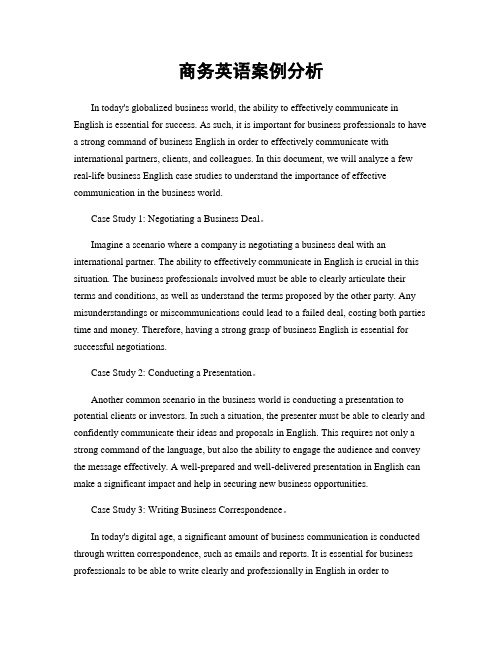
商务英语案例分析In today's globalized business world, the ability to effectively communicate in English is essential for success. As such, it is important for business professionals to have a strong command of business English in order to effectively communicate with international partners, clients, and colleagues. In this document, we will analyze a few real-life business English case studies to understand the importance of effective communication in the business world.Case Study 1: Negotiating a Business Deal。
Imagine a scenario where a company is negotiating a business deal with an international partner. The ability to effectively communicate in English is crucial in this situation. The business professionals involved must be able to clearly articulate their terms and conditions, as well as understand the terms proposed by the other party. Any misunderstandings or miscommunications could lead to a failed deal, costing both parties time and money. Therefore, having a strong grasp of business English is essential for successful negotiations.Case Study 2: Conducting a Presentation。
体验商务英语综合教程2 unit2 Case study

Our advertising budget is 300,000 – at least!
Share costs on a 70%/30% basis (70% Lifetime Holidays ) Media: include radio advertising. Investment and profits 50%/50%basis. We suggest that your company manages the project because of your greater experience and knowledge of selling online.
We reach an agreement on a joint venture!
We need a four-year contract. Our destinations is offer all the holidays in both companies’. Our customers aim at all age groups. We can provide car hire and insurance services as they are very profitable for your company. Our advertising budget is 250,000 pounds. Share costs on 50/50 basis. Media :Mail shots and press adverting. Investment and profits 50%/50% basis. We decided that we manages the project together.
《商务英语综合教程》 Unit (2)

1. school
a building where young people receive education
2. hospital
3. farm
4. office
5. factory
6. supermarket
A. Brainstorming
Please find out people that will appear in the certain workplaces and fill in the following blanks. For example, we can find teachers and students at school.
stick together and achieve business success.
5. We could lose our most
worker, maybe even have to close
the club for a while.
Section A Vocabulary
Complete the following sentences with the words given.
2. What type of people is regarded as the right staff? 3. How can we encourage personalization according
to the passage? 4. What does the author mean by “Give them the
Additional Reading
3. Technology
It goes without saying that the office should be wired to support Wi-Fi to maximize the flexibility of the space. The positioning of your office no longer needs to be dictated by where the network connection and outlets are located. Of equal importance is making sure your office technology supports employees who work from home – either occasionally or regularly. Making it possible to access files anytime and anywhere, as well as using video conferencing and other collaborative meeting technologies, is part of the flexible office design process.
体验商务英语综合教程2 -- Unit 1 Careers
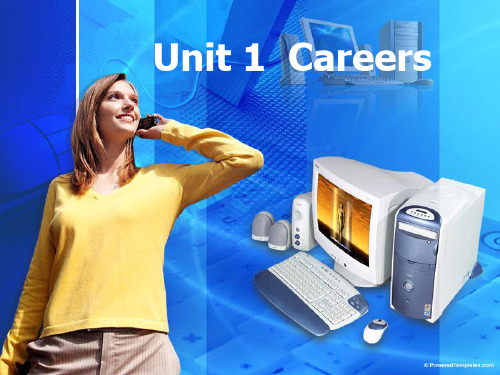
Patty Stonesifer President and Chairman Gates Library Foundation Redmond, Washington
I left a great job as head of interactive media at Microsoft for one reason: the passion was gone. My pocketbook, ego, and sense of excitement were being satisfied, but I no longer had passion for the challenges I faced each day. Lots of people thought I was crazy to walk away from it all. But I felt like a juggler -- managing projects, budgets, and people. Eventually I found my dream job. It aligns my personal expertise and goals with an opportunity to put technology in the hands of people who otherwise would not have access to it. No matter how high your career registers on the conventional charts, you've got to listen to your heart
6. Ambitious people often ________ on a career plan while they are still
chapter 2商务英语专业跨文化交际第2章 案例 理论 习题答案

Japan
Over-courtesy and male-dominated
Joke appreciation for cultural diversity
2.
Before the man saying sorry, the woman gave him a name-card and said: “This is my lawyer’s phone number. He will talk with you about your sex harassment. See you in the court.”
owl
receiver
A symbol of wisdom as wise as an owl
D=D C‡C
猫头鹰 A symbol of bad luck
More examples
风水,经脉,知识份子,干部,……
公&母
Generic term chicken Duck goose male cock, rooster Drake gander female hen Duck goose young chick Duckling gosling
Hopi: 霍皮人(美国亚利桑那州东南部印第安村庄居民
1.2 Semantics in ICC
Case Analysis: shoes for Street Walking It is said that in Rome, in front of a shoe store, there was such a sign to attract English-speaking customers: Shoes for street walking. Come in and have a fit. The sign caught the attention of many English-speaking tourists, but not look at the shoes displayed in the window, but to read the sign and then break into laughter. The Italian shop owner did not realize that “a street walker” means a prostitute, while “to have a fit” does not mean to have a try, but to become suddenly and violently angry or upset. No wonder the amusement and laughter!
剑桥商务英语中级词汇
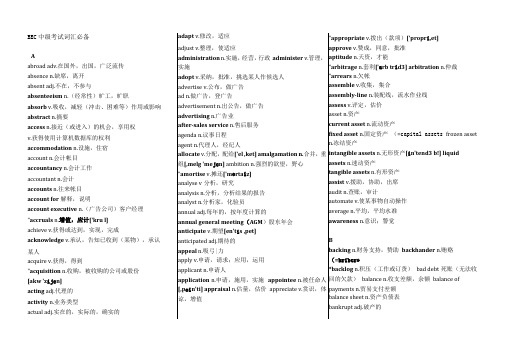
BEC中级考试词汇必备Aabroad adv.在国外,出国,广泛流传absence n.缺席,离开absent adj.不在,不参与absenteeism n.(经常性)旷工,旷职absorb v.吸收,减轻(冲击、困难等)作用或影响abstract n.摘要access n.接近(或进入)的机会,享用权v.获得使用计算机数据库的权利accommodation n.设施,住宿account n.会计帐目accountancy n.会计工作accountant n.会计accounts n.往来帐目account for解释,说明account executive n.(广告公司)客户经理"accruals n.增值,应计['kru l]achieve v.获得或达到,实现,完成acknowledge v.承认,告知已收到(某物),承认某人acquire v.获得,得到"acquisition n.收购,被收购的公司或股份[akw 'z ije n]acting adj.代理的activity n.业务类型actual adj.实在的,实际的,确实的adapt v.修改,适应adjust v.整理,使适应administration n.实施,经营,行政administer v.管理,实施adopt v.采纳,批准,挑选某人作候选人advertise v.公布,做广告ad n.做广告,登广告advertisement n.出公告,做广告advertising n.广告业after-sales service n.售后服务agenda n.议事日程agent n.代理人,经纪人allocate v.分配,配给['el ,ket] amalgamation n.合并,重组[,melg 'me je n] ambition n.强烈的欲望,野心"amortise v.摊还['m o rta i z]analyse v分析,研究analysis n.分析,分析结果的报告analyst n.分析家,化验员annual adj.每年的,按年度计算的annual general meeting(AGM)股东年会anticipate v.期望[en't i s ,pet]anticipated adj.期待的appeal n.吸弓|力apply v.申请,请求;应用,运用applicant n.申请人application n.申请,施用,实施appointee n.被任命人[,p oi n'ti] appraisal n.估量,估价appreciate v.赏识,体谅,增值"appropriate v.拨出(款项)['propr i,et]approve v.赞成,同意,批准aptitude n.天资,才能"arbitrage n.套利['a rb tr i d3] arbitration n.仲裁"arrears n.欠帐assemble v.收集,集合assembly-line n.装配线,流水作业线assess v.评定,估价asset n.资产current asset n.流动资产fixed asset n.固定资产(=capital assets frozen assetn.冻结资产intangible assets n.无形资产[i n'tend3 b!] liquidassets n.速动资产tangible assets n.有形资产assist v.援助,协助,出席audit n.查账,审计automate v.使某事物自动操作average n.平均,平均水准awareness n.意识;警觉Bbacking n.财务支持,赞助backhander n.贿赂(=briber»*backlog n.积压(工作或订货)bad debt死账(无法收回的欠款)balance n.收支差额,余额balance ofpayments n.贸易支付差额balance sheet n.资产负债表bankrupt adj.破产的bankruptcy n.破产bank statement n.银行结算清单(给帐户的),银行对账单bar chart n.条形图,柱状图bargain v.谈判,讲价base n.基地,根据地ba忙h n.一批,一组,一群batch production 批量生产bear market n.熊市beat v.超过,胜过behave v.表现,运转behaviour n.举止,行为,运转情况below-the-line advertising线下广告,尚未被付款的广告benchmark n.衡量标准benefit n.利益,补助金,保险金得益fringe benefits n.附加福利sickness benefit n.疾病补助费bid n.出价,投标takeover bid n.盘进(一个公司)的出价bill n.账单,票据billboard n.(路边)广告牌,招贴板black adj.违法的in the black有盈余,贷方black list黑名单,禁止贸易的(货物、公司及个人)名单black Monday n.黑色星期一,指1987年10月国际股票市场崩溃的日子blue chips n.蓝筹股,绩优股blue-collar adj.蓝领(工人)的Board of Directors n.董事会Bond n.债券bonus n.津贴,红利books n.公司帐目book value n.账面价值,(公司或股票)净值bookkeeper n.簿记员,记帐人boom n.繁荣,暴涨boost v.提高,增加,宣扬bottleneck n.瓶颈,窄路,阻碍bottom adj.最后的,根本的v.到达底部,建立基础bounce v.支票因签发人无钱而遭拒付并退回brainstorm n./v.点子会议,献计献策,头脑风暴branchn.分支,分部brand n.商标,品牌brand leader n.占市场最大份额的品牌,名牌brand loyalty n.(消费者)对品牌的忠实break even v.收支相抵,不亏不盈break even point收支相抵点,盈亏平衡点breakthrough n.突破brief n.摘要brochure n.小册子broker n.经纪人,代理人bull market 牛市budget n.预算bulk n.大量(货物)adj.大量的bust adj.破了产的buyout n.买下全部产权CCAD(=Computer Aided Design) n.计算机辅助设计call n.打电话call on v.呼吁,约请,拜访campaign n.战役,运动candidate n.求职者,候选人canteen n.食堂canvass v.征求意见,劝说capacity n.生产额,(最大)产量caption n.照片或图片下的简短说明capital n.资本,资金capture v.赢得cash n.现金,现付款v.兑现cash flow n.现金流量case study n.案例分析catalogue n.目录,产品目录catastrophe n.大灾难,大祸CEO n. Chief ExecutiveOfficer (美)总经理chain n.连锁店challenger n.拟匕战者channel n.(商品流通的)渠道charge n.使承担,要(价),把……记入(账册等)chart n.图表checkout n.付款台chief adj.主要的,首席的,总的CIF, c.i.f.成本保险费加运费circular n.传阅的小册子(传单等)circulate v.传阅claim n./v.要求,索赔client n.委托人,顾客cold adj.没人找上门来的,生意清淡的commercialise v.使商品化commission n.佣金*commitment n.承诺commodity n.商品,货物company n.公司limited (liability) company (ltd.)股份有限公司public limited company (plc) n.股票上市公司compensate v.补偿,酬报compensation n.补'偿,酬金compete v.比赛,竞争competition n.比赛,竞争competitor n.竞争者,对手competitive adj.竞争性的component n.机器元件、组件、部件,部分concentrated marketing n.集中营销策略condition n.条件,状况*configuration n.设备的结构、组合conflict n.冲突,争论"conglomerate n.综合商社,多元化集团公司*consolidate v.帐目合并"consortium n.贝才团constant adj.恒定的,不断的,经常的consultant n.咨询人员,顾问,会诊医生consumables n.消耗品consumer durables n.耐用消费品(如:洗衣机)consumer goods n.消费品,生活资料"contingency n.意外事件continuum n.连续时间contract n.合同,契约contractor n.承办商,承建人contribute v.提供,捐献contribution n.贡献,捐献,税conversion n.改装,改造conveyor n.运送,传递,转让core time n.(弹性工作制的)基本上班时间(员工于此段时间必须上班,弹性只对除此以外的时间有效)cost n.成本fixed costs固定成本running costs日常管理费用variable costs 可变成本cost-effective adj.合算的,有效益的costing n.成本计算,成本会计credit n.赊购,赊购制度credit control赊销管理(检查顾客及时付款的体系)letter of credit 信用证credit limit赊销限额credit rating信贷的信用等级,信誉评价creditor n.债权人,贷方"creditworthiness n.信贷价值,信贷信用crisis n.危机,转折点critical adj.关键的"critical path analysis n.关键途径分析法currency n.货币,流通current adj.通用的,现行的Current account往来帐户,活期(存款)户current assets n.流动资产current liabilities n.流动负债customise v.按顾客的具体要求制造(或改造等);顾客化cut-throat adj.残酷的,激烈的cut-price a.削价(出售)的CV(=curriculum vitae) n.简历,履历"cycle time n.循环时间Ddamages n.损害,损失deadline n.最后期限deal n.营业协议,数量v.交易dealer n.商人debit n.借方,欠的钱v.记入帐户的借方debt n.欠款,债务to get into debt 负债to be out of debt 不欠债to pay off a debt 还清债务debtor n.债务人aged debtors长期债务人declare v.申报,声明decline n./v.衰退,缓慢,下降decrease v.减少deduct v.扣除,减去default n.违约,未履行defect n.缺陷defective adj.有缺点的defer v.推迟deferred payments n.延期支付deficit n.赤字delivery cycle n.交货周期*demand management n.需求规化demotivated adj.消极的,冷谈的deposit n.储蓄,预付(定金)depot n.仓库depreciate v.贬值,(对资产)折旧depressing adj.令人沮丧的deputy n.代理人,副职,代理devalue v.货币贬值(相对于其它货币)diet n.饮食,食物,特种饮食differentiation n.区分,鉴别dimensions n.尺寸,面积,规模direct v管理,指导director n.经理,主管Managing Director n.总经理direct cost n.直接成本direct mail n.(商店为招揽生意而向人们投寄的)直接邮件direct selling n.直销,直接销售directory n.指南,号码簿discount n.折扣,贴现dismiss v.让..... 离开,打发走dismissal n.打发走dispatch n./v.调遣display n./v.展出,显示dispose v.安排,处理(事务)dispose of去掉,清除distribution n.分配,分发,分送产品"diversify v.从事多种经营;多样化divest v.剥夺dividend n.股息,红利,年息division n.部门*dog n.滞销品down-market a./ad.低档商品的*down-time/downtime n.设备闲置期DP(=Data Processing) n.计算机数据处理,计算机数据处理部门dramatic adj.戏剧性的drive n.积极性,能动性due adj.应付的,预期的dynamic adj.有活力的Eearnings n.工资efficiency n.效率endorse v.背书,接受engage v.雇用entitle v.授权entitlement n.应得的权利holiday entitlement n.休假权equity n.股东权益equity capital n.股本equities普通股,股票estimated demand n.估计需求evaluate v.估价,评价eventual adj.最终的exaggerate v.夸张exceed v.超过exhibit n.展览,表现expenditure n.花费,支出额expense n.费用,支出expense account n.费用帐户expenses n.费用,业务津贴expertise n.专长,专门知识和技能"exposure n.公众对某一产品或公司的知悉;广告所达到的观众总数Ffacilities n.用于生产的设备、器材facilities layout n.设备的布局规化、计划facilities location n.设备安置"factoring n.折价购买债券*fail-safe system n.安全系统feasibility study n.可行性研究feedback n.反馈,反馈的信息field n.办公室外边,具体业务file n.文件集,卷宗,档案,文件v.把文件(或资料)归档fill v.充任finance n.资金,财政v.提供资金financial adj.贝才政的financing n.提供资金,筹借资金finished goods n.制成品firm n.公司fire v.解雇fix v.确定,使固定在fix up v.解决,商妥fiscal adj.国库的,财政的*flagship n.同类中最成功的商品,佼佼者flexible adj.有弹性的,灵活的flextime n.弹性工作时间制flier(=flyer) n.促销传单float v.发行股票flop n.失败flow shop n.车间fluctuate v.波动,涨落,起伏FOB, f.o.b n.离岸价*follow-up n.细节落实,接连要做的事forecast v.预测four P's指产品PRODUCT、价格PRICE、地点PLACE、促销PROMOTIONframework n.框架,结构*franchise n.特许经销权v.特许经销,给予特许经销权guarantee n.保证,保单guidelines n.指导方针,准则Hhand in v.呈送hand in one's notice 递交辞呈handle v.经营*hands on adj.有直接经验的hard sell n.强行推销hazard n.危险,危害行为head n.主管,负责health and safety n.健康和安全*hedge n.套期保值hidden adj.隐藏的,不明显的hierarchy n.等级制度,统治集团,领导层hire v.雇用hire purchase n.分期付款购物法hit v.击中,到达holder n.持有者holding company n.控股公司hostile adj.不友好的,恶意的HRD n.人力资源发展部human resources n.人力资源*hype n.天花乱坠的(夸张)广告宣传Iimpact n.冲击,强烈影响implement v.实施,执行franchisee n.特许经营人franchiser n.授予特许经营权者fraud n.欺骗*freebie n.(非正式的)赠品,免费促销的商品freelance n.& adj.自由职业者(的)funds n.资金,基金futures n.期货交易Ggap n.缺口,空隙*gearing n.配称(即定息债务与股份资本之间的比率)*gimmick n.好主意,好点子goal n.目标going adj.进行的,运转中的going rate n.产品的市场价格goods n.货物,商品goodwill n.声誉*go public v.首次公开发行股票grapple with v.与...... 搏斗,尽力解决grievance n.申诉,抱怨gross adj.总的,毛的gross margin n.毛利率gross profit n.毛利gross yield n.毛收益gradually adv.逐渐地group n.(由若干公司联合而成的)集团grow v.增长,扩大growth n.增长,发展implication n隐含意义incentive n.刺激;鼓励income n.工资或薪金收入,经营或投资的收入earned income劳动收入,劳动所得unearned income非劳动收入,投资所得increment v.定期增加incur v招致,承担"indemnity n.偿还,赔偿index n.指数,索弓|retail price index零售价格指数indirect costs n.间接成本induction n.就职industrial adj.工业的industrial action n.(罢工、怠工等)劳工行动industrial relations n.劳资关系inefficiency n.低效率,不称职inflate v.抬高(物价),使通货等)膨胀inflation n.通货膨胀"infringe v.违法,违章initial adj.初步的innovate v.革新input n.投入insolvent adj.无清偿力的installment n.部分,分期付款insure v.给..... 保险,投保insurance n.保险interest n.利息,兴趣interest rate n.利率interim n.中期,过渡期间intermittent production n.阶段性生产interview n./v.面试interviewee n.被面试的人interviewer n.主持面试的人,招聘者introduce v.介绍,提出"inventory n.库存buffer inventory n.用于应付突发性需求的存货capacityinventory n.用于将来某时使用的存货cycle inventory n.循环盘存decoupling inventory n.保险性存货(以应付万一)finished goods inventory n.制成品存货(盘存)pipeline inventory n.在途存货raw materials inventory n.原材料存货work-in-progress inventory n.在制品盘存(存货)invest v.投资investment n.投资investor n.投资者invoice n.发票v.给(某人)开发票irrevocable adj.不可撤消的,不能改变的issue n.发行股票* rights issue n.优先认股权IT=Information Technology 信息技术item n.货物,条目,条款Jjob n.工作job description工作说明,职务说明*job lot n. 一次生产的部分或少数产品job mobility工作流动job rotation工作轮换job satisfaction工作的满意感(自豪感)*job shop n.专门车间jobbing n.为一次性的或小的订货需求而特设的生产制度joint adj.联合的joint bank account (几个人的)联合银行存款帐户journal n.专业杂志*jurisdiction n.管辖(权)junk bonds n.低档(风险)债券,垃圾债券junk mail n.(未经收信人要求的)直接邮寄的广告宣传*just-in-time n.无库存制度Kkey adj.主要的,关键的knockdown adj.(价格)很低的know-how n.专门技术Llabel n.标签,标牌v.加标签,加上标牌labour n.劳动,工作,劳动力labour market劳动力市场labour relations 劳资关系labour shortage劳动力短缺*launch v.在市场推出一种新产品n.新产品的推出lay-off/layoff n./v.临时解雇literature n.(产品说明书之类的)印刷品,宣传品litigate v.提出诉讼loan n./v.贷款,暂借logo n.企业的特有标记lose v.亏损loser n.失败者loss n.损失lot n.批,量loyalty n.忠诚,忠实Mmagazine n.杂志,期刊mailshot n.由B购maintain v.维持,保持maintenance n.维持,坚持major adj.重大的,主要的,较大的majority shareholding 绝对控股make n.产品的牌子或型号make-to-order adj.根据订货而生产的产品make-to-stock adj.指那些在未收到订货时就已生产了的产品management n.管理,管理部门middle management n.中层管理人员senior management n.高层管理人员managerial adj.管理人员的,管理方面的manager n.经理plant manager n.工厂负责人line manager n.基层负责人staff manager n.部门经理助理management accounts n.管理帐目matrix management n.矩阵管理*management information system(MIS) n. 管理信息系统manning n.人员配备manpower n.劳动力manpower resources n.劳动力资源manual adj.体力的,人工的,蓝领的manufacture v.(用机器)制造manufacturer n.制造者(厂、商、公司) manufacturing adj.制造的manufacturing industry 制造业margin n.利润gross margin n.毛利率net margin n.净利润mark-up v.标高售价,加价market n.市场;产品可能的销量down market adv./adj.低档商品/地的up market adj./adv.高档商品的/地marketing mix n.综合营销策略,指定价、促销、产品等策略的配合market leader n.市场上的主导公司*market niche n.小摊位,专业市场的一个小部分market penetration n.市场渗入market segmentation 市场划分market share n.市场占有率,市场份额*mass-marketing n.大众营销术*master production schedule n.主要生产计划U*material requirements planning(MRP) n.计算layout n.工厂的布局lead v.领先,领导lead time n.完成某项活动所需的时间leaflet n.广告印刷传单lease n.租借,租赁物legal adj.合法的lend v.出借,贷款lessee n.承租人lessor n.出租人*ledger n.分类帐nominal ledger n.记名帐purchase ledger n.进货sales ledger n.销货帐*leverage n.杠杆比率liability n.负债liabilities n.债务licence(US: license) n.许可证license v.许可,批准life cycle n.寿命周期likely adj.可能的*line process流水线(组装)link n.关系,联系,环liquid adj.易转换成现款的liquidate v.清算*liquidity n.拥有变现力liquidation n.清理(关闭公司),清算liquidator n.清算人,公司资产清理人listed adj.登记注册的listing n.上市公司名录生产中所需材料的方法"materials handling n.材料管理,材料控制maximise v.使增至最大限度、最大化measure n.措施,步骤media n.新闻工具,传媒mass media大众传媒(如电视、广播、报纸等)merchandising n.(在商店中)通过对商品的摆放与促销进行经营merge v.联合,合并merger n.(公司,企业等的)合并merit n.优点,值得,应受method study n.方法研究middleman n.中间人,经纪人full milk n.全脂牛奶skimmed milk n.脱脂乳minimise v.使减至最小限度,最小化"mission n.公司的长期目标和原则mobility n.流动性,可移性moderately adv.中等地,适度地monopoly n.垄断,独占mortgage n./v.抵押motivate v.激励,激发……的积极性motivated adj.有积极性的motivation n.提供动机,积极性,动力motive n.动机Nnegotiate v.谈判negotiable adj.可谈判的,可转让的net adj.净的,纯的network n.网络*niche n.专业市场中的小摊位notice n.通知,辞职申请,离职通知Oobjective n.目标,目的obsolete adj.过时的,淘汰的,废弃的offer n.报价,发盘offer v.开价off-season adj./adv.淡季的off-the-shelf adj.非专门设计的off-the-peg adj.标准的,非顾客化的opening n.空位operate v.操作,经营,管理operating profits 营业利润"operations chart n.经营(管理)表"operations scheduling n.生产经营进度表opportunity n.机会"optimize v.优化option n.选择权share option n.期权organigram n.组织图organisation chart n.公司组织机构图orient v.定向,指引orientation n.倾向,方向;熟悉,介绍情况outcome n.结果outlay n.开销,支出,费用"outlet n.商店a retail outlet 零售店outgoings n.开支,开销outlined adj.概括,勾勒的草图output n.产量"outsource v.外购产品或由外单位制做产品outstanding adj.未付款的,应收的over-demand n.求过于供overdraft n.透支overdraft facility 透支限额overdraw v.透支"overhead costs n.营业成本"overheads n.企业一般管理费用overpay n.多付(款)overtime n.力口壬班overview n.概述,概观owe v.欠钱,应付Pp.a.(二per annum) n.每年packaging n.包装物;包装parent company n.母公司,总公司part-time adj.部分时间工作的,业余的participate v.参加,分享(in)partnership n.合伙(关系),合伙,合伙企业patent n.专利pay n.工资,酬金v.付钱,付报酬take-home pay实得工资payroll n.雇员名单,工资表peak n.峰值,顶点penetrate v.渗透,打入(市场)penetration n.目标市场的占有份额pension n.养老金,退休金perform v.表现,执行performance n.进行,表现工作情况performance appraisal n.工作情况评估perk n.额外待遇(交通、保健、保险等)personnel n.员工,人员*petty cash n.零用现金phase out n.分阶段停止使用*pick v.提取生产用零部件或给顾客发货* picking list n.用于择取生产或运输订货的表格pie chart n.饼形图pilot n.小规模试验pipeline n.管道,渠道plant capacity n.生产规模,生产能力plot v.标绘,策划*plough back n.将获利进行再投资* point of sale (POS) n.销售点policy n.政策,规定,保险单*portfolio n.(投资)组合*portfolio management n.组合证券管理post n.邮件,邮局;职位position n.职位potential n.潜在力,潜势power n.能力purchasing power 贝勾买力PR二Public Relations 公共关系*preference shares n.优先股price n.价格market price市场价,市价retail price 零售价probation n.试用期product n.产品production cycle n.生产周期production schedule n.生产计划【Jproduct life cycle n.产品生命周期product mix n.产品组合(种类和数量的组合)productive adj.生产的,多产的*profile n.简介形象特征profit n.利润operating profit n.营业利润profit and loss account n.损益帐户project v.予预测promote v .推销promotion n.提升,升级proposal n.建议,计划prospect n.预期,展望prospectus n.计划书,说明书prosperity n.繁荣,兴隆prototype n.原型,样品*publicity n.引起公众注意public adj.公众的,公开的go public 上市public sector公有企业publicity n.公开场合,名声,宣传publics n.公众,(有共同兴趣的)一群人或社会人士punctual adj.准时的punctuality n.准时purchase v. & n.贝勾买purchaser n.买主,采购人QQC(=Quality Circle) n.质检人员qualify v.有资格,胜任qualified adj.有资格的,胜任的,合格的qualification n.资格,资格证明quality n.质量quality assurance n.质量保证quality control质量控制,质量管理quarterly adj./adv.季度的,按季度questionnaire n.调查表,问卷quote n.报价,股票牌价quotation n.报价,股票牌价RR&D Research and Development 研究与开发radically adv.根本地,彻底地raise n.(美)增加薪金v.增加,提高;提出,引起range n.系列产品rank n./v.排名rapport n.密切的关系,轻松愉快的气氛rate n.比率,费用fixed rate固定费用,固定汇率going rate现行利率,现行汇率rating评定结果ratio n.比率rationalise v.使更有效,使更合理raw adj.原料状态的,未加工的raw material n.原材料receive v.得至1」receipt n.收据receiver n.接管人,清算人accounts receivable 应收帐receivership n.破产管理recession n.萧条reckon v.估算,认为recognise v.承认reconcile v.使...... 相吻合,核对,调和recoup v.扣除,赔偿recover v.重新获得,恢复recovery n.重获,恢复recruit v.招聘,征募n.新招收的人员recruitment n.新成员的吸收red n.红色in the red赤字,负债reduce v.减少reduction n.减少redundant adj.过多的,被解雇的redundancy n.裁员,解雇reference n.参考,参考资料reference number (Ref. No.)产品的参考号码refund n./v.归还,偿还region n.地区*reimburse v.偿还,报销reject n./v.拒绝reliability n.可靠性relief n.减轻,解除,救济relocate v.调动,重新安置remuneration n.酬报,酬金rent v.租n.租金rep (代表)的缩写report to v.低于(某人),隶属,从属reposition v.(为商品)重新定位represent v.代表,代理representative n.代理人,代表reputation n.名声,声望reputable adj.名声/名誉好的reserves n.储量金,准备金resign v.放弃,辞去resignation n.舌辞职resistance n.阻力,抵触情绪respond v.回答,答复response n.回答,答复restore v.恢复result/results n.结果,效果retail n./v.零售retailer n.零售商*retained earnings n.留存收益retire v.退休retirement n.退休return n.投资报酬*return on investment (ROI) n.投资收入,投资报酬revenue n.岁入,税收review v./n.检查reward n./v.报答,报酬,奖赏*rework v.(因劣质而)重作risk capital n.风险资本rival n.竞争者,对手adj.竞争的rocket v.急速上升,直线上升,飞升ROIReturn on Investment 投资利润roughlyadv.粗略地round adj.整数表示的,大约round trip往返的行程royalty n.特许权,专利权税run v.管理,经营running adj.运转的Ssack v.解雇sales force销售人员sample n.样品v.试验;抽样检验*saturation n.(市场的)饱和(状态)saturate v.饱和save v.节省,储蓄savings n.存款scale n.刻度,层次scapegoat n.替罪羊scare adj.缺乏的,不足的*scrap n.废料或废品seasonal adj.季节性的section n.部门sector n.部门"securities n.债券及有价证券segment n.部分v.将市场划分成不同的部分segmentation n.将市场划分成不同的部门semi-skilled adj.半熟练的settle v.解决,决定settlement n.解决,清偿,支付service n.服务,帮佣services n.专业服务settle v.安排,支付set up v.创立share n.股份shareholder n.股东*shelf-life n.货架期(商品可以陈列在货架上的时间)shift n.轮班showroom n.陈列室simulation n.模拟shop n.商店closed shop限制行业(只允许本工会会员)open shop开放行业(非会员可从事的工作)shop steward工会管事shopfloor生产场所shortlist n ............ 供最后选择的候选人名单v.把……列入最后的候选人名单sick adj.病的sick leave 病假sick note病假条sick pay病假工资sickness 生病skill n.技能,熟巧skilled employee n.熟练工人*skimming n.高额定价,撇奶油式定价slogan n.销售口号slump n.暴跌a slump in sales 销售暴跌soft-sell n.劝诱销售(术),软销售(手段)software n.软件sole adj.仅有的,单独的sole distributor独家分销商solvent adj.有偿付能力的*sourcing n.得到供货spare part n.零部件specification n.产品说明split v.分离spokesman n.发言人sponsor n.赞助者(为了商品的广告宣传)spread n.(股票买价和卖价的)差额stable adj.稳定的staff n.职员stag n.投机认股者v.炒买炒卖stagnant adj.停滞的,萧条的*statute n.成文法statutory adj.法定的steadily adv.稳定地,平稳地stock n.库存,股票stock exchange n.证券交易所*stockbroker n.股票经纪人stock controller库房管理者storage n.贮藏,库存量strategy n.战略*streamline v.精简机构,提高效率stress n.压力,紧迫strike n.罢工structure n.结构,设备*subcontract v.分包(工程项目),转包subordinate n.下级adj.下级的subscribe v.认购subsidiary n.子公司subsidise v.补贴,资助subsidy n.补助金substantially adv.大量地,大幅度地summarise v.概括,总结superior n.上级,长官supervisor n.监督人,管理人supervisory adj.监督的,管理的supply n./v.供给,提供survey n 调查*SWOT analysis n. SWOT分析是分析一个公司或一个项目的优点、弱点、机会和风险*synergy n.协作Ttactic n.战术,兵法tailor v.特制产品tailor made products 特制产品take on雇用takeover n.接管target n.目标v.把……作为目标tariff n.关税;价目表task n.任务,工作task force n.突击队,攻关小队(为完成某项任务而在一起的一组人)tax n.税,税金capital gains tax n.资本收益税corporation tax n.公司税,法人税income tax n.所得税value added tax 增值税tax allowance 免减税tax avoidance 避税taxable可征税的taxation 征税tax-deductible在计算所得税时予以扣除的telesales n.电话销售,电话售货temporary adj.暂时的temporary post 临时职位tender n./v.投标territory n.(销售)区域tie n.关系,联系throughput n.工厂的总产量TQC(=Total Quality Control) n.全面质量管理*track record n.追踪记录,业绩trade n./v.商业,生意;交易,经商balance of trade 贸易平衡trading profit 贸易利润insider trading 内部交易trade mark 商标trade union 工会trainee n.受培训者*transaction n.交易,业务transfer n./v.传输,转让*transformation n.加工transparency n.(投影用)透明胶片treasurer n.司库,掌管财务的人*treasury n.国库,财政部trend n.趋势,时尚*trouble-shooting n.解决问题turnover n.营业额,员工流动的比率staff turnover人员换手率stock turnover股票换手率Uundertake v.从事、同意做某事undifferentiated marketing n.无差异性营销策略uneconomical adj.不经济的,浪费unemployment n.失业unemployment benefit n.失业津贴unit n.单位unit cost n.单位成本update v.使现代化up to date adj./adv.流行的,现行的,时髦的upgradev.升级,增加upturn n.使向上,使朝上USP唯一的销售计划Vvacancy n.空缺vacant adj.空缺的value n./v.价值,估价valuation n.价值value-added n.增加值variable n.可变物variation n.变化,变更variety n.多样化a variety of多种多样的vary v.改变,修改VAT Value Added Tax 增值税vendor n.卖主(公司或个人)venture n.冒险,投机venue n.地点,集合地点viable adj.可行的viability n.可行性vision n.设想,公司的长期目标vocation n.行业,职业vocational adj.行业的,职业的Wwage n.(周)工资wage freeze n.工资冻结warehouse n.仓库,货栈wealth n.财富,资源wealthy adj.富裕的,丰富的welfare n.福利white-collar白领阶层white goods n.如冰箱和洗衣机等用在厨房中的产口口口wholesale n./adj./adv.批发wholesaler 批发商*wind up v.关闭公司withdraw v.拿走,收回,退出withdrawal n.拿走,收回,退出wholesale n./a.批发;批发的wholesaler n.批发商work n.工作working conditions n.工作条件work-in-progress n.工作过程workload n.工作量work order n.(包括原料、半成品、成品的)全部存货总量work station工作位置*working capital n.营运资本,营运资金write off v.取消write-off n.债务的取消Z*zero defect n.合格产品*zero inventory n.零存货Y*yield n.有效产量。
BEC商务英语口语词汇详解
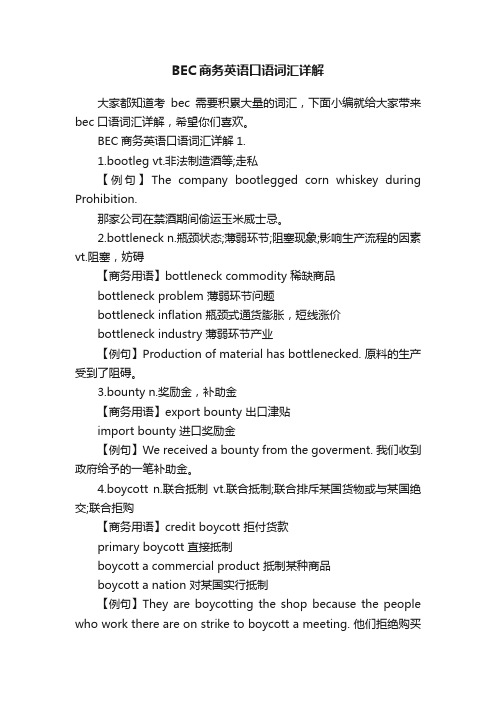
BEC商务英语口语词汇详解大家都知道考bec需要积累大量的词汇,下面小编就给大家带来bec口语词汇详解,希望你们喜欢。
BEC商务英语口语词汇详解1.1.bootleg vt.非法制造酒等;走私【例句】The company bootlegged corn whiskey during Prohibition.那家公司在禁酒期间偷运玉米威士忌。
2.bottleneck n.瓶颈状态;薄弱环节;阻塞现象;影响生产流程的因素vt.阻塞,妨碍【商务用语】bottleneck commodity 稀缺商品bottleneck problem 薄弱环节问题bottleneck inflation 瓶颈式通货膨胀,短线涨价bottleneck industry 薄弱环节产业【例句】Production of material has bottlenecked. 原料的生产受到了阻碍。
3.bounty n.奖励金,补助金【商务用语】export bounty 出口津贴import bounty 进口奖励金【例句】We received a bounty from the goverment. 我们收到政府给予的一笔补助金。
4.boycott n.联合抵制vt.联合抵制;联合排斥某国货物或与某国绝交;联合拒购【商务用语】credit boycott 拒付货款primary boycott 直接抵制boycott a commercial product 抵制某种商品boycott a nation 对某国实行抵制【例句】They are boycotting the shop because the people who work there are on strike to boycott a meeting. 他们拒绝购买那家商店的货物,因为店里的员工正在为联合抵制一个会议而罢工。
5.brainstorm n.灵机一动 vt.集中各人智慧猛攻【例句】We need to brainstorm a more permanent solution to a problem. 我们需要群策群力,设法找到一个长期有效的解决办法。
普通高等学校本科商务英语专业教学指南
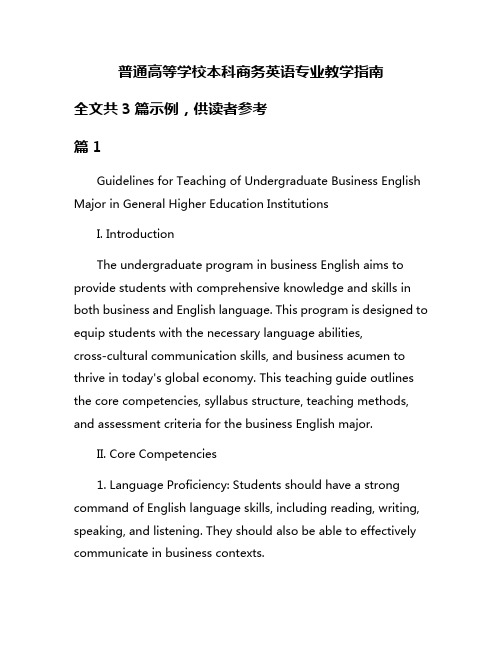
普通高等学校本科商务英语专业教学指南全文共3篇示例,供读者参考篇1Guidelines for Teaching of Undergraduate Business English Major in General Higher Education InstitutionsI. IntroductionThe undergraduate program in business English aims to provide students with comprehensive knowledge and skills in both business and English language. This program is designed to equip students with the necessary language abilities,cross-cultural communication skills, and business acumen to thrive in today's global economy. This teaching guide outlines the core competencies, syllabus structure, teaching methods, and assessment criteria for the business English major.II. Core Competencies1. Language Proficiency: Students should have a strong command of English language skills, including reading, writing, speaking, and listening. They should also be able to effectively communicate in business contexts.2. Business Knowledge: Students should have a solid understanding of key business concepts, practices, and trends. They should be able to analyze business situations, make strategic decisions, and solve business problems.3. Cross-cultural Communication Skills: Students should be able to navigate cultural differences and communicate effectively with people from different cultural backgrounds. They should have a good understanding of cross-cultural communication theories and practices.4. ICT Skills: Students should be proficient in using information and communication technologies for business purposes. They should be able to use tools like MS Office, email, and internet research effectively.III. Syllabus StructureThe syllabus for the business English major is divided into core courses, elective courses, and practical training. Core courses cover topics such as business communication, marketing, finance, and international business. Elective courses allow students to choose specialized areas of study, such as business negotiation, business law, or intercultural communication. Practical training includes internships, field trips, and industry projects that provide students with real-world experience.IV. Teaching Methods1. Lecture: Lectures are used to introduce key concepts and theories in business English. They provide students with a theoretical foundation for further study.2. Discussion: Discussions allow students to engage with course material and apply it to real-life business situations. They promote critical thinking and analytical skills.3. Case Studies: Case studies are used to analyze and solve practical business problems. They help students develop decision-making and problem-solving skills.4. Group Projects: Group projects encourage collaboration and teamwork among students. They require students to apply their knowledge and skills to a specific business case.5. Role-plays: Role-plays simulate real-life business scenarios and help students practice their communication and negotiation skills.V. Assessment CriteriaAssessment in the business English major includes a mix of exams, assignments, presentations, and group projects. Assessments are designed to evaluate students' language proficiency, business knowledge, critical thinking, andcommunication skills. The assessment criteria include accuracy, fluency, relevance, depth of analysis, and creativity.In conclusion, the teaching of the undergraduate business English major in general higher education institutions should be student-centered, interactive, and practical. By following these guidelines, educators can effectively prepare students for success in the global business environment.篇2Teaching Guide for Undergraduate Business English Major in Regular Higher Education InstitutionsI. IntroductionThe undergraduate business English major is designed to provide students with a comprehensive understanding of both business and English language skills. This teaching guide aims to help educators deliver high-quality instruction to students pursuing this major.II. Curriculum Overview1. Core Courses- Business English Communication: This course focuses on the development of students' oral and written communicationskills in a business context. It covers various topics such as business correspondence, presentations, and negotiations.- Business English Writing: This course helps students improve their writing skills for business purposes, including emails, reports, and proposals.- Business English Listening and Speaking: This course aims to enhance students' listening and speaking abilities in a business setting. It includes activities such as role-plays, discussions, and presentations.2. Elective Courses- Intercultural Communication: This course explores the impact of culture on business communication and provides strategies for effective intercultural communication.- Business English Translation: This course focuses on the translation of business documents from English to Chinese and vice versa.- Business English for Specific Purposes: This course caters to students' interests and needs in specialized areas such as finance, marketing, or human resources.III. Teaching Strategies1. Active Learning: Encourage students to participate in discussions, group activities, and case studies to apply their knowledge in real-world situations.2. Technology Integration: Incorporate multimedia tools, online resources, and language learning apps to enhance students' learning experience.3. Real-World Application: Invite guest speakers from the business field to share their experiences and provide insight into the practical application of business English skills.IV. Assessment Methods1. Written Assignments: Assign essays, reports, and case studies to assess students' writing skills.2. Oral Presentations: Evaluate students' ability to communicate effectively through presentations onbusiness-related topics.3. Exams: Administer quizzes and exams to test students' knowledge of business English concepts and vocabulary.V. Professional DevelopmentEncourage students to participate in internships, workshops, and networking events to gain practical experience and build professional connections in the business field.VI. ConclusionThe teaching guide outlined above serves as a roadmap for educators to deliver a rigorous and comprehensive education to undergraduate business English majors. By implementing effective teaching strategies and assessment methods, educators can help students develop the necessary skills to succeed in the global business environment.篇3Teaching Guide for Undergraduate Business English Major in Ordinary institutions of Higher LearningI. IntroductionThe undergraduate business English major is designed to equip students with solid English language skills and business knowledge to prepare them for careers in various business sectors. This teaching guide aims to provide a comprehensive overview of the curriculum, teaching methods, and assessment strategies for the program.II. Curriculum1. Core Courses:- English Language Skills: This course focuses on developing students' listening, speaking, reading, and writing skills in English.- Business Communication: Students will learn how to effectively communicate in a business setting, including writing business emails, reports, and presentations.- Business English: This course covers business vocabulary, grammar, and cultural aspects of communication in a business context.- International Business: Students will gain an understanding of international business practices, trade, and global markets.2. Elective Courses:- Marketing: This course provides an overview of marketing principles, strategies, and tactics.- Finance: Students will learn about financial management, investment, and accounting principles.- Human Resources Management: This course covers topics such as recruitment, training, and performance evaluation in organizations.- Entrepreneurship: Students will learn about starting and managing a business, including business planning and operations.III. Teaching Methods1. Lectures: Lectures are used to introduce new concepts and theories to students. They are typically followed by discussions and group activities to deepen understanding.2. Case Studies: Case studies are used to illustrate real-life business situations and allow students to apply theoretical knowledge to practical scenarios.3. Group Projects: Group projects encourage collaboration and teamwork among students. They can include business simulations, research assignments, and presentations.4. Workshops: Workshops focus on developing specific skills, such as business writing, presentation skills, and negotiation techniques.IV. Assessment Strategies1. Exams: Exams test students' knowledge of course material and may include multiple-choice, short answer, and essay questions.2. Assignments: Written assignments, such as essays, reports, and research papers, are used to assess students' research and writing skills.3. Presentations: Students are required to present their work to the class, demonstrating their communication and presentation skills.4. Participation: Participation in class discussions, group activities, and workshops is also assessed to evaluate students' engagement and contribution to the program.V. ConclusionThe undergraduate business English major is a challenging program that aims to develop students' English language proficiency and business acumen. By following the curriculum, using effective teaching methods, and implementing assessment strategies, educators can help students succeed in their academic studies and future careers in the business world.。
商务英语BEC高级难点词汇解析汇总二
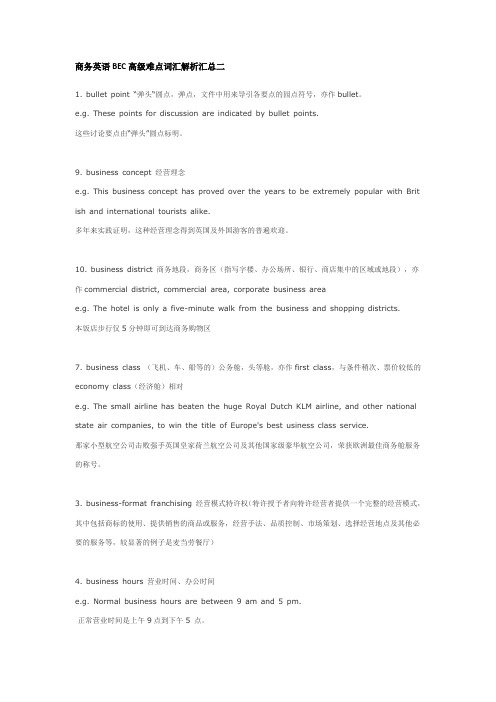
商务英语BEC高级难点词汇解析汇总二1. bullet point “弹头“圆点,弹点,文件中用来导引各要点的园点符号,亦作bullet。
e.g. These points for discussion are indicated by bullet points.这些讨论要点由“弹头”圆点标明。
9. business concept 经营理念e.g. This business concept has proved over the years to be extremely popular with Brit ish and international tourists alike.多年来实践证明,这种经营理念得到英国及外国游客的普遍欢迎。
10. business district 商务地段,商务区(指写字楼、办公场所、银行、商店集中的区域或地段),亦作commercial district, commercial area, corporate business areae.g. The hotel is only a five-minute walk from the business and shopping districts.本饭店步行仅5分钟即可到达商务购物区7. business class (飞机、车、船等的)公务舱,头等舱,亦作first class,与条件稍次、票价较低的economy class(经济舱)相对e.g. The small airline has beaten the huge Royal Dutch KLM airline, and other national state air companies, to win the title of Europe's best usiness class service.那家小型航空公司击败强手英国皇家荷兰航空公司及其他国家级豪华航空公司,荣获欧洲最佳商务舱服务的称号。
体验商务英语综合教程2 教案
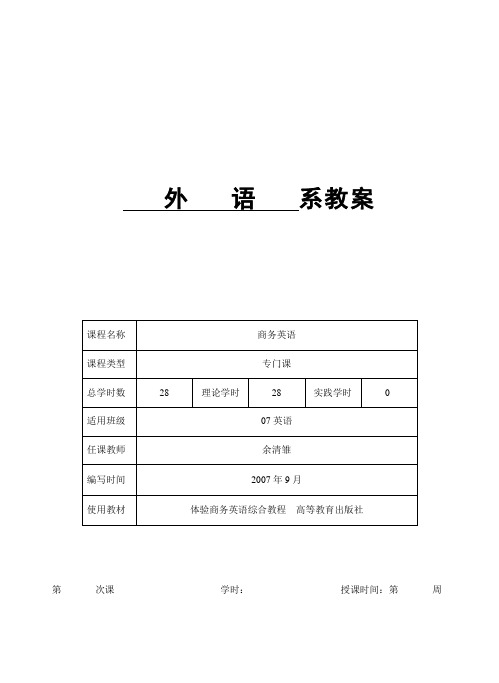
外语系教案第次课学时:授课时间:第周Context: Unit 1Title: IntroductionsThe tone of a business relationship can be set by an initial introduction. It is important to make a good impression right from the first handshake. When meeting businesspeople for the first time, is it better to be formal or informal? If in doubt, advise students to adopt a more formal approach. Here are some points to remember when making business introductions in English-speaking Western countries:a.Introduce businesspeople in order of professional rank –the person of highestauthority is introduced to others in the group in descending order, depending on their professional position.b.When possible, stand up when introductions are being made.c.If clients are present, they should be introduced first.d.The same and title of the person being introduced is followed by the name and titleof the other person.PROCEDURESLesson 1Starting upSs listen to four businesspeople and match the speakers to their business cards. Vocabulary 1: Job titlesSs list word as job titles or departments. Then Ss talk about their jobs or studies. Vocabulary 2: NationalitiesSs match countries and nationalities.Reading: Describing peopleThis reading section can be completed in two parts. Ss can start preparatory work on the article about Phil Knight, the founder and CEO of Nike, and complete Exercise A. Lesson 2Reading: Describing peopleSs complete more detailed comprehension questions about Phil Knight (Exercise B and C). Language focus 1: to beSs are introduced to positive and negative forms of the verb to be.Language focus 2: a/an with jobs; wh- questionsSs look at the use of a/an before vowels and consonants and are introduced to what, who and where question words.Lesson 3Listening: Talking about yourselfSs listen to three people talking about their jobs.Skills: Introducing yourself and othersSs listen to three conversations where people introduce themselves and others. They then practice introductions.Lesson 4Case study: Aloha in HawaiiSs find out information about people at a conference.WritingSs write an e-mail about two people from the conference.第次课学时:授课时间:第周Context: Unit 2Title:Work and leisureIt has never been easy to balance work and leisure. During the late twentieth century the concept of a job for life was largely replaced by the short-term contracts favored by the enterprise culture. Some found themselves with too much free time n their hands when company restructures led to redundancies. Others saw leisure time shrink and working hours increase in exchange for greater financial rewards. The British TUC estimates that, despite European Union legislation, 4 million people in the UK work more than 48 hours per week and 1 in 25 work over 60 hours. It is thought that managers and professional staff work the longest hours.PROCEDURESLesson 1Starting upSs listen to four people talking about what they want from work and make word partnerships.Vocabulary 1: Days, months, datesSs practice days, months and dates and use the prepositions in, at and on with time phrases.Lesson 2Reading: Describing your routineSs read an article about the working day of Michael Dell, Chairman of Dell computers. Language focus 1: Present simpleSs look at the present simple to talk about habits and work routines.Vocabulary 2: Leisure activitiesSs use leisure activities, verbs and time phrases to talk about leisure time.Lesson 3Language focus 2: Adverbs and expressions of frequencySs complete exercises using adverbs and expressions of frequency and listen to three people talking about their typical day.Skills: Talking about work and leisureSs match questions and answers about work and leisure and then listen to a conversation about what Tim does at the weekend. Afterwards they talk about their own work and leisure activities.Lesson 4Case study: Independent Film CompanySs role play an interview between Human Resources and unhappy employees of a film company.WritingSs use the information from the case study to list the working conditions they want to change.第次课学时:授课时间:第周Context: Unit 3Title:ProblemsProblems are a fact of life. So problem-solving is an essential life skill both at home and in the office. Many pressurized managers in the modern business world may benefit from training in conflict resolution to resolve disagreements. It is wise to deal with sensitive matters face-to-face. Irate e-mails and memos often contain sentiments we would modify if speaking to the person directly. Social psychologist Albert Merabian says that words account for seven percent of communication, tone 38 percent and body language 55 percent. These elements are particularly useful in understanding and resolving potential conflict situation but can be lost in cyber communication. PROCEDURESLesson 1Starting upSs match sentences and problems and listen to five phone calls to identify the product and the problem.Vocabulary: AdjectivesSs look at the adjectives and their opposites and use too and enough.Lesson 2Reading: Dealing with problems at workFour people answer the question: ‘What are the biggest problems facing your company?’Language focus 1: Present simple: negatives and questionsSs match questions and answers, make negative sentences and practice the question forms in a role play.Lesson 3Language focus 2: have gotSs look at the use of have got, haven’t got and Have you got? To talk about possession. Skills: Telephoning: solving problemsSs listen to four phone calls where people talk about problems. Then they role play a phone conversation talking about problems with a product.Lesson 4Case study: Blue HorizonGuests of a holiday company compare their holiday apartments with the holiday brochure and complain to a representative of the company.WritingSs listen to a voice mail and write a telephone message for the manager of Blue Horizon. 第次课学时:授课时间:第周Context: Unit 4Title:TravelAround 1400 BC Polynesians paddled across the open ocean in canoes, serching for new trading partners, and the age of business travel began. The modern businessperson is more likely to choose flying as the quickest way of getting from A to B. Although safer than canoe, this can still pose hazards. Frequent fliers are likely to encounter a number of hurdles that can lead to increased stress levels. First, you have to acturally get on the plane. Most airlines overbook to minimise seat wastage and no-shows. This means that if all the passengers who actually booked seats turn up, there could be a shortage of place. If there are not enough volunteers to give up their seats, then you may find yourself bumped – denied boarding and put on a later flight.PROCEDURESLesson 1Starting upSs talk about things they like and don't like when travelling on business. Vocabulary: Travel detailsSs practise the alphabet and numbers 1-100 and match verbs and travel phrases. Listening: Listening for informationSs listen and answer questions about travel information.Lesson 2Language focus 1: can/ can’tSs put a dialogue into the correct order and then listen to check. Then Ss role play a conversation using can/ can’t.Reading: Business hotelsSs read about facilities in The Tower Hotel.Lesson 3Language focus 2: there is/ there areSs complete sentences using ther is/ there are and carry out a role play about a new job abroad.Skills: Making bookings and checking arrangmentsSs listen and answer questions about booking a hotel room before role playing a similar situation.Lesson 4Case study: Pacific HotelA hotel manager and assistant manager allocate rooms to twelve guests at a small hotel. WritingSs write a fax to one of the guests confirming arrangements.第次课学时:授课时间:第周Context: Unit 5Title:Food and entertainmentFood can communicate complex messages about status, nationally and identity. The fashion for eating out in restaurant was adopted by the upper classes during the French revolution. Most English words relating to eating out are adopted from the French (hotel, café, menu, chef, etc.) including restaurant, which was originally from the French verb meaning ‘to store’. Later, the migrations of the twentieth century proved fertile ground for mingling cuisines and a knowledge of the vast variety on offer is viewed as a mark of modern cosmopolitan taste.PROCEDURESLesson 1Starting upSs talk about the kind of food they like and match dishes and countries. Vocabulary: Eating outSs look at food groups and different parts of a menu.Reading: TippingThis reading section can be completed in two parts. Ss match jobs with places where people work. Then Ss talk about what services they tip before completing a table about which countries tip most often (Exercises A-C).Lesson 2Reading: TippingSs read an article about factors that encourage people to tip and answer comprehension questions (Exercises D-E).Language focus 1: some/anySs correct mistakes using some and any and underline the correct words in a dialogue. Listening: Ordering a mealSs listen to what a man and a woman order in a restaurant.Lesson 3Language focus 2: Countable and uncountable nounsSs identify countable nouns and complete exercises using a lot of, many or much. Skills: EntertainingSs look at language for entertaining visitors in a restaurant and listen and respond to a waiter’s questions.Lesson 4Case study: Which restaurant?Three colleagues decide which restaurants to choose to entertain three important customers.WritingSs write an e-mail inviting a customer to dinner and giving details about the restaurant. 第次课学时:授课时间:第周Context: Unit 6Title:SalesThings have come a long way since the days when peddlers went from door to door selling wares from a pack. Now advertisements pop up as text messages. Goods can be ordered by mall order. We can compare prices, get quotes, check if an item is in stock and place an order without moving away from our computer screen. In some ways the methods o buying and selling have undergone a revolution and in others little has changed since the early 1900s when keywords in sales were service and relationships. A modern sales force uses a mixture of tried and tested techniques and new technology to increase sales. The foundation of modern sales techniques was developed in the 1950s and includes gaining the client’s interest, building desire by showing product features or giving samples, increasing conviction by comparing the product with competitors or using statistics to highlight benefits and, finally, closing the deal.PROCEDURESLesson 1Starting upSs listen to three people talk about where and when they buy products. Vocabulary 1: Buying and sellingSs complete a sales leaflet for a computer company and listen to a conversation between a buyer and seller.Lesson 2Reading: Thirsty for success?Ss read a job advertisement for a sales representative in a soft drinks company. Language focus 1: Past simpleSs complete a sales report using the past simple.Vocabulary 2: Buying and sellingSs complete a leaflet for a car hire company.Lesson 3Listening: SellingKevin Warren, the Vice President, Sales and Marketing, of Coca-Cola Enterprises, gives some advice to salespeople.Language focus 2: Past time referencesSs are introduced to expressions that refer to the past, such as ago, last (week), for, on, from… to, in and during.Skills: Presenting a productSs listen to a salesperson presenting a product at a trade fair. Then they role play being the buyer and seller at a trade fair.Lesson 4Case study: Link-up LtdA company sells mobile phones and service packages. Ss role play being salespeople and customers.WritingSs write an e-mail to a colleague about what phone and service package a customer wants, using information from the case study.第次课学时:授课时间:第周Context: Unit 7Title:PeopleWhat charactreristics can help people to succeed in business and in life? A positive attitude, intelligence, perserverance and self discipline all help. Are the personality traits that contribute to success or failiure genetic? Or do we learn these characeristics are we grow up? Experts still disagree as to whether nature or nurture is more important.Can personality and intelligence be measured? IQ and psychometric tests remain popular, and the latter are still used by many companies as part of the selection process. However, in recent years the idea that only one type of intelligence exists has been criticised. Howard Gardner developed the theory of multiple intelligence. This said that people have a number of different types of intelligence that they possess to varying degrees. These are linguistic, musical, logical-mathematical, spatical, body-kinesthetic, intrapersonal(e.g. insight) and interpersonal (e.g. social skills and the ability to understand and motivate other people).PROCEDURESLesson 1Starting upSs answer a questionnaire about what sort of person they are.Vocabulary: Describing peopleSs look at the adjectives to describe people’s personalities.Listening: A difficult colleagueA property developer talks about a colleague who left the company.Lesson 2Language focus 1: Past simple: negatives and questionsSs focus on past simple negatives and questions and write questions using Why, How long, What, When and Where.Reading: Stella McCartneySs read an article about the fashion designer Stella McCartney. Ss then match verbs and nouns to make word partnerships.Lesson 3Language focus 2: Questions formsSs look at yes/no questions and open questions. They complete a questionnaire and then listen to check answers.Skills: Negotiating: dealing with problemsSs listen to a conversation about problems of understafing in a company. Then they role paly a conversation negotiating a new company car.Lesson 4Case study: A people problemA US food coompany has problems with a business manager.WritingSs write a memo aobut their meeting.第次课学时:授课时间:第周Context: Unit 8Title:MarketsIf a company wants to sell a product or service successfully, it ust identify the target market. There are many different types of market to choose from. The mass market aims to sell to as many people as possible, crossing age and income groups. In contrast, a niche market focuses on a narrowly defined group fo customers. It often caters to a need that has been overlooked by those suppliers who cater to markets which deal in more mainstream products or sevices. Focussing on niche markets can be cost effective as marketing campaigns can sim budgets directly at potential customers, for example through advertising on local radil or in magazines targeting special interst gorups. PROCEDURESLesson 1Starting upSs ask and answer questions about a populatioin pie chart.Vocabulary: Types of marketSs listen and repeat large numbers and look at adjectives to describe markets.Lesson 2Reading: The car market in ChinaSs answer quesitons and search for large numbers in an article aobut the Chiese car market.Language focus 1: Comparatives and superlativesSs practice comparative and superlative forms of adjectives..Lesson 3Listening: Doing business in RussiaSs listen to three parts of a presentation about doing business in Russia.Language focus 2: much/ a lot, a little/ a bitSs use the language to compare cars and pool talbes and use a bar chart to talk about sales in Russia and Poland.Skills: Telephoning: solving problemsSs listen to three marketing executives talking about a new snack bar and then role play taking part in a marketing meeting.Lesson 4Case study: Cara CosmeticsA body care company is launching a new shampoo. Ss siscuss the name , size and price of the product, main outlet and income group of the target market.WritingSs write a short description of the new shampoo for Cara Cosmetics catalogue.第次课学时:授课时间:第周Context: Unit 9Title:CompaniesA company is an organisation that produces goods or services to make a profit. There ar e many different types.A small business might become a medium or large business. If a company sells directly to the public, it is a retil business. A wholesale business sells goods in bulk to other companies. Some companies have Ltd in their name. This stands for limited company. Here, shareholders only lose what they invested if the company goes bankrupt. A company with PLC after its name is a Public limited company – its shares can be freely bought and sold. In contrast a Private limited company only passes shares to another person if other shareholders agree. A conglomerate consists of several companies that have joined together. A multinational or transnational company has global operations in many different countries.PROCEDURESLesson 1Starting upSs do a companies quiz and then talk about famous companies from their country. Listening: The Mini rangeSs listen to the Corporate Communications Managers for the Mini range of cars at BMW. Language focus 1: Present continuousSs look at the present continuous for temporary ations and things that are happening now.Lesson 2Vocabulary: Describing companiesSs complete exercises to describe two companies and then complete a company profile. Reading: LVMHSs read about LVMH, the luxury goods manufacturer.Lesson 3Language focus 2: Present simple or present continuousThe tenses are compared and contrasted. Ss then do exercises to find the correct tense before carrying out a role play showing someone around a company.Skills: Starting a presentationSs listen to the start of a presentation and use notes to introduce their own presentation.Lesson 4Case study: You and your companySs role play introducing themselves and their company at a training course on giving presentations.WritingSs write a short profile about their company from the information in the case study.第次课学时:授课时间:第周Context: Unit 10Title:The WebNow that the Internet has arrived, it is difficult to imagine how we lived without it; it is has revolutionised communications. Changes are taking place at an incredible speed. Hardware is becoming more compact, faster and more affordable, allowing more individuals and companies to utilise the Net. In the past, research took longer, important documents got lost in the post and information could be difficult to find. Unfortunately this revolution has brought with it a new set of problems. Research is certainly quicker but connections can be slow, making it difficult to access the websites that you need. Documents can still get lost, but now they float around cyberspace. Spam can be a problem when you e-mail account becomes overloaded with advertising that you don't want. But more sinister are the various computer viruses which can make your computer crash. And not all countries have equal access to the advantages of new technology. PROCEDURESLesson 1Starting upSs listen to people talking about what they use the Internet for and then talk about their own Internet use.Vocabulary: Internet termsSs read advice about using the Internet and match Internet terms with their definitions.Listening: Website designA website designer talks about his job.Lesson 2Language focus 1: Talking about future plansSs look at the use of the present continuous for future use and going to for future plans. Reading: E-commerceSs look at an article about making money form the internet.Vocabulary 2: Time ecpressionsSs complete future time expressions such as by net year, in two week s’ time, tomorrow evening, in the near future.Lesson 3Language focus 2: willSs use will to complete exercises about future events and predictions. Then they role play a meeting to talk about the launch of a new website.Skills: Making arrangemensSs listen to four people making and changing arrangements by phone and role play similar situations.Lesson 4Case study: Isis Books plcThe marketing director and two sales representatives of an Internet business book company plan a sales trip to Poland and Russia.WritingSs write an e-mail to customers to confirm the date and time of the appointment arranged in the case study..第次课学时:授课时间:第周Context: Unit 11Title:CulturesCompanies which deal in the global marketplace need to be able to adapt to different business cultures. It is easier to make a good impression in our own culture than in another, where our knowledge of the language and rules of behavior may be limited. Knowledge of the protocol and etiquette in the countries we do business with is essential. Protocol is adhering to the correct procedures and conduct in formal situations. This involves knowing the acceptable way to behave and includes formalities of rank, which denotes the level of a person’s position in an organisation. Etiquette focusses on communicating in a respectful and polite way in accordance with the good manners and accepted norms of the culture.PROCEDURESLesson 1Starting upSs look at tips for visiting another country or doing business there.Vocabulary: Company culturesSs complete sentences about different company cultures.Listening: Cultural mistakesSs listen to three people talk about cultural mistakes they have made.Lesson 2Language focus 1: should/ shouldn'tSs use should and shouldn't to give advice and make suggestions.Reading: Fast food in JapanAn American sandwich chain has problems with their Japanese franchise. Ss are introduced to phrasal verbs.Lesson 3Language focus 2: could/ wouldSs look at could and would to make requests and offers.Skills: Identifying problems and agreeing actionSs listen to a human resources manager talking to the general manager of a company about problems with an employee. The Ss role play a similar problem.Lesson 4Case study: A change of cultureA general manager of an overseas bank encounters problems from the staff when she wants to introduce new ideas.WritingSs write action minutes for the meeting they had in the case study.第次课学时:授课时间:第周Context: Unit 12Title:JobsThere are valuable skills that make job seekers attractive to employers:Technical skills – which include the specialist knowledge that will help them do the job. Personal skills –personality, attitude, personal work habits and style. (Can they work under pressure? Can they work as a part of a team as well as unsupervised?). Transferable skills – the basic skills learnt through everyday situations or previous work experience that can be usefully applied to a new position.PROCEDURESLesson 1Starting upSs discuss which jobs should get the highest salary and what aspects they would like or not like in a job.Vocabulary: Skills and abilitiesSs use verbs to complete a job advertisement.Language focus 1: Present perfectSs look at the use of the present perfect to talk about actions that continue from the past to the present.Lesson 2Reading : A curriculum vitaeSs put headings in the correct place and answer questions about a curriculum vitae.Lesson 3Language focus 2: Past simple and present perfectThe tense are compared and contrasted. Ss complete a text using the correct form of the verb and look at time expressions that go with each tense.Skills: Interview skillsSs look at interview tips, listen to an interview and role play an interview situation.Lesson 4Case study: High Profile Inc.The marketing director and the human resources director of a sports agency interview candidates for a job.WritingSs write a letter to the successful candidate from the case study interview.第次课学时:授课时间:第周Book IIContext: Unit 1Title:CareersReports of the death of the traditional career have been greatly exaggerated. Despite the growth of outsourcing (buying in services that were previously performed by a company’s employees from outside the organisation) and teleworking by freelancers working from home communicating via the Internet, most professional people still go to what is recognisably a job in a building that is recognisably an office. The average tenure, the length of time that people spend in a particular job, has remained unchanged (at about seven years) for two decades.PROCEDURESLesson 1Starting upSs talk about their level of ambition and say what makes for a successful career. Vocabulary: Career movesSs look at typical word combinations and verbs used with career.Listening : Human resources and recruitmentSs listen to a public relations professional who advises companies on human resources and recuitment.Lesson 2Reading: Female train driversSs read an article about the recruitment of female underground train drivers in London.Language review: Modals 1Ss look at modals used for ability, requests and offers (can, could and would) and do exercises based around a job interview.Lesson 3Skills: Telephoning: making contactSs listen to some calls and learn how to get through to who they want to speak to, leave messages, etc.Lesson 4Case study: Blue HorizonSs choose the right candidate for an internal promotion within an international training company.第次课学时:授课时间:第周Context: Unit 2Title:Selling onlineThe world of e-commerce moves fast. The dotcom frenzy of the late 1990s, with companies raising vast amounts of money from investors, for example just to sell dog food over the Internet, came and went, and some organisations removed the dotcom suffix from their names, so much did it become a synonym for failure. E-commerce courses in business schools are no longer oversubsribed and no longer preaching that ‘everything has changed’. Companies look more at how e-commerce can be used in conjunction with other methods of selling: in retailing this means clicks and mortar, combining traditional retail outlets with online operations, ratther than investing in a whole new expensive infrastructure.PROCEDURESLesson 1Starting upSs talk about traditional shopping versus buying online and goods typically bought online Vocabulary: Shopping onlineSs work on words related to buying and selling.Listening: Selling onlineSs listen to the founder of the British operation of Amazon talk about how to succeed in online selling.Lesson 2Reading: Virtual pocket moneyTeenagers buy a lot online. The article looks at payment methods they can use to do this. Language review: Modals 2Ss apply modals for obligation, necessity and prohibition (must, need to, have to and should) in the context of rules for an online book club and in an interview.Lesson 3Skills: Negotiation: reaching agreementSs discuss tips for successful negotiating, listen to a negotiation and then role play one themselves.Lesson 4Case study: Blue HorizonA traditional package holiday company wants to team up with an online business. Ss role play negotiations between the two companies.第次课学时:授课时间:第周Context: Unit 3Title:CompaniesMultinationals are the most visible of companies. Their local subsidiaries give them sometimes global reach, even if their corporate culture, the way they do things, depends largely on their country of origin. But the tissue of most national economies is made up of much smaller organisations. Many countries owe much of their prosperity to SMEs (small and medium-sized enterprise) with tens or hundreds of employees, rather than the tens of thousands employed by large corporations. Small businesses with just a few employees are also important. Many governments hope that the small businesses of today will become the multinationals of tomorrow, but many owners of small companies chose to work that way because they find it more congenial and do not want to expand. PROCEDURESLesson 1Starting upSs talk about the types of company they would most like to work for and the business sector they work in now.Vocabulary: Company vocabularySs look at vocabulary used to describe companies and that used in company reports to describe performance.Listening: Reasons for successSs listen to the sales manager of a UK motocycle manufacturer talk about the factors that make his company successful.Lesson 2。
商务英语对话 case study
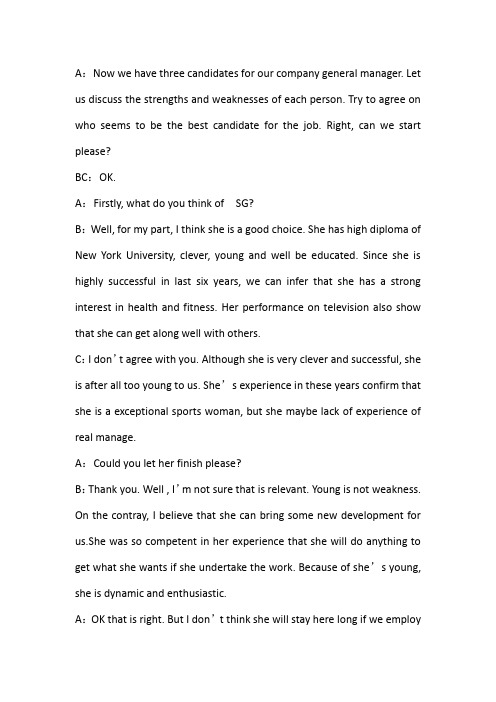
A:Now we have three candidates for our company general manager. Let us discuss the strengths and weaknesses of each person. Try to agree on who seems to be the best candidate for the job. Right, can we start please?BC:OK.A:Firstly, what do you think of SG?B:Well, for my part, I think she is a good choice. She has high diploma of New York University, clever, young and well be educated. Since she is highly successful in last six years, we can infer that she has a strong interest in health and fitness. Her performance on television also show that she can get along well with others.C:I don’t agree with you. Although she is very clever and successful, she is after all too young to us. She’s experience in these years confirm that she is a exceptional sports woman, but she maybe lack of experience of real manage.A:Could you let her finish please?B:Thank you. Well , I’m not sure that is relevant. Young is not weakness. On the contray, I believe that she can bring some new development for us.She was so competent in her experience that she will do anything to get what she wants if she undertake the work. Because of she’s young, she is dynamic and enthusiastic.A:OK that is right. But I don’t think she will stay here long if we employher. Now she has got married but have no children.I think soon in the future she may be pregnant and concentrate her energy on her baby. This will delay her work.C:Yeah. What is more? She is used to following drug taking, we can’t employ a person who has bad news.A:I agree . SG is not a good choice. I think we should move on now. How do you feel about MB? AS far as I am concerned, he is better than SG. He has four years with international sports good manufacturer as a Marketing Director. In addition, he has previous experience with a variety of firms, he has too much experience in manage,which SG is lack. He is also good at computers and he can speak a little Spanish.C:I don’t think so. Becaus of a good track record in previous job, He is often forceful, determined and with strong views. He like to keep his distance from people,too assertive and cold. He cannot communicate with others well.B:Yeah, we all know that cooperation in job is very important, we can’t employ a person who lack of outstanding communication skills.C:And he has often changed jobs.Now we need a person who can be stable in our company.A:OK. Finally, let’s turn to the last person, BW. How about him? I think we should discuss this a bit more.C:Firstly, I think he is suitable for us because he has taken courses inmarketing, management and computing. With special field of study, he will be more professional than others in this job.Secondly, since he has travelled all over the world, he can work with people from different cultural backgrounds. I believe he has more advantage on organisational skills.A:But he has just studied in high school, I’m worry bout that he has not enough knowledge to do this job.C:I don’t think it does not matter. Nowdays education level is not equal with ability.B:So what do you think about him?C:I think he has ability to do this job. He can speak Spanish fluently,it is very useful to business cooperation project in globalisation.A:Oh..... compared with others, these skills are exactly very rarely.C:Moreover, he has a lot of friend ,maybe he will bring us more business chance.A:OK, let us go over what we have agreed. Now we all think BW is the best candidate.。
Case-Study商务英语案例分析
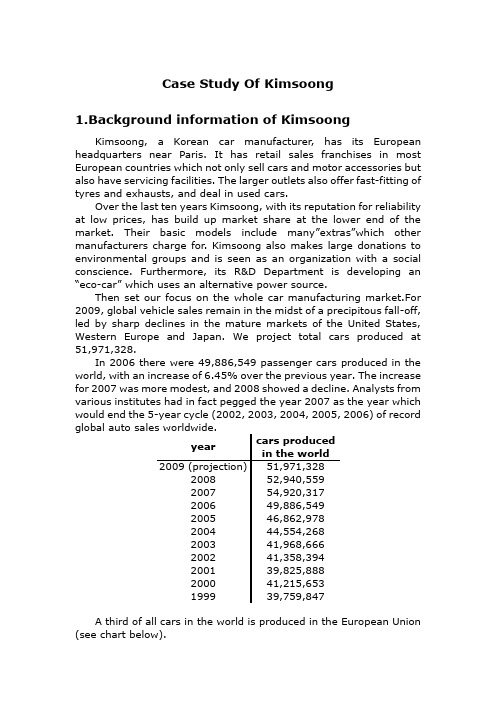
Case Study Of Kimsoong1.Background information of KimsoongKimsoong, a Korean car manufacturer, has its European headquarters near Paris. It has retail sales franchises in most European countries which not only sell cars and motor accessories but also have servicing facilities. The larger outlets also offer fast-fitting of tyres and exhausts, and deal in used cars.Over the last ten years Kimsoong, with its reputation for reliability at low prices, has build up market share at the lower end of the market. Their basic models include many”extras”which other manufacturers charge for. Kimsoong also makes large donations to environmental groups and is seen as an organization with a social conscience. Furthermore, its R&D Department is developing an “eco-car” which uses an alternative power source.Then set our focus on the whole car manufacturing market.For 2009, global vehicle sales remain in the midst of a precipitous fall-off, led by sharp declines in the mature markets of the United States, Western Europe and Japan. We project total cars produced at 51,971,328.In 2006 there were 49,886,549 passenger cars produced in the world, with an increase of 6.45% over the previous year. The increase for 2007 was more modest, and 2008 showed a decline. Analysts from various institutes had in fact pegged the year 2007 as the year which would end the 5-year cycle (2002, 2003, 2004, 2005, 2006) of recordA third of all cars in the world is produced in the European Union (see chart below).China became the world’s third-largest car market in 2006, as car sales in China soared by nearly 40% to 4.1 million units. China should become the world’s second-largest car market by 2010, as low vehicle penetration, rising incomes, greater credit availability and falling car prices lift sales past those of Japan. Furthermore, vehicle penetration in China stands at only 24 vehicles per 1,000 people, compared with 749 vehicles per 1,000 people in the mature markets of the G7.It is estimated that over 600,000,000passenger cars travel the streets and roads of the world today.In the United States alone, 247,421,120 "highway" registered vehicles were counted in 2005, of which 136,568,083 passenger cars. (Bureau of Transportation Statistics U.S. Department of Transportation)So with the high development of car manufacture, we may face many difficulties. There are so many cars produced in the world, the only thing we can do to keep our position is to become more competitive in this market, or we’ll drive out by its high competition.2. Kimsoong customer profileCustomers are the god of our company, thus the survey of customers’ tastes and basic information is important for us to know better of our shortage, and we’ll also serve more people in the future and gain more profits. The following forms are information we have got from our customers.We can see that the majority of the customers are men who are under 30, they are employed. However, women between 31 and 50 who are self-employed have potential to buy our cars.Our repeated customers only occupy 15% of the whole. People who buy our cars are mostly middle income group. This is a hint that if we want to hold on to existing customers, we must produce cars that are affordable by middle income group. But to attract new customers we should provide different kinds of cars for differentAs the form shows, customers are not satisfied with our service. The competitor’s cars are better in performance and service. These are two main reasons that hinder us to maintain existing customers. The after-sale care is just fair. In a word, customers care more about their price, reliability, after-sales service, etc. We should improve our service and convince customers of the reliability of our cars at the same time.By collecting and analyzing customer profiles, we may conclude that we can make improvement by producing cars suit every age stage, providing reasonable price for middle income group, improving our after-sales service to hold on to existing customers. We should also create cars for women and for self-employed persons and even students. High level cars with high price will attract people of high income group. These may help gain more profits.3.ProblemFacing the intense competition, the company must remain unchanged with its reputation for reliability at low prices and has its excellent office workers and loyal customers, also the skill and cooperation are very important parts. The management should solve these problems.(1).Cutomer profilesThe company’s new strategy is to hold on to existing customers and increase customer loyalty. And the company also hope to develop a more accurate buyer profile. Customers are very important to a company. So the company should know about the customers well so that we can produce the products that fit the customers. Only in this way can our company make profits.(2). The excellent office workersThe excellent office workers in the company is also a big problem. For one hand, the younger office workers have much knowledge but a little experience; on the other hand ,the elder office wor kers don’t have as much knowledge as the young but they have enough experience. They are all excellent, but the company doesn’t ha ve enough money to hire both the young and the elder ones. So the problem is that the company should choose what kind of the officers they need by using less money to make more money.(3).Improving skillsImproving skills is also a big problem to the company. Because of the ever-accelerated science and technology, having a superb skill cansave cost and make profits.(4).CooperationLast but not the least, cooperation is very important to the company. But the company’s staffs are lack of the skills of grasping good communication. So if the company want to do better, they must promote social skills and competence.4.SolutionsAiming at the problems given above, we summarize some solutions to those problems:(1).Building up relationshipsTo builds up long-term customer relationships, thereby increasing profits.To establish long-term cooperation relations, the customer is one of the important factors that assure our company’s long-term and stable development. In the long-term cooperation relations, the company can not only improve enterprise image, enterprise credibility still can bring stability of the interests of the enterprise income. Only in this way, can the enterprise form a security capital chain. Additionally, through this long-term cooperation, we can build trust with each other and win good enterprise image, thus our company will expand more customer groups and win more profits.(2).Increasing customer loyaltyIncreasing customer loyalty is to guarantee the premise of enterprise sales. First, our company shall keep good communication with customers. The price for the customers must be given favorable; we can also use the gifts method to increase satisfaction. Cheap and good things will receive the love of consumers, so we should be radically improve the competitiveness of our enterprise, by improving product s’performance in all aspects so as to reduce the cost. Once the cost reduced, we will not only attract more customers to buy our cars, but also enhance our profit space, that is kill two birds with one stone. (3).Drawing up an accurate buyer profileEnterprise’s accurate understanding of his client group is very important. The company should not only know the customer's age distribution, but have an understanding of what kind of car sales good. At the same time, we must pay attention to customer s’feedback, make market surveys, know what kind of car our customers really want to buy. From these information we will realize our company’s deficiencies, so as to further improve their product, as well as theenterprise’s all aspects of operation.(4).Encouraging staffsTo encourage staffs to be more active in building up good customer relations.It is not enough to just have a good car, a good people who can promote it is necessary. So encourage staffs to establish good relationship with customers is very important. Nowadays, the consumer not only pays attention to the quality of the product itself, but is very concern about enterprise service attitude. First, the company shall encourage the staffs to work hard to establish a good relationship with their clients. For those who have outstanding performance , the company sales should give them full praise and encouragement. For those who not work hard, and have poor work performance, our company shall take appropriate punishment. Everyone must have crisis consciousness. Second, team spirit is very important. The common saying says more people, more powerful. Only we work together can we create more profits for our company.5.ConclusionFrom the report above, we can see that good customer relationships are very important for our further development. Only when we win our customers’ loyalty, can we gain more profits and make a good reputation. Thus, improvement of all aspects, including staff training, survey of customers and potential ones, change of disciplines and politics in our company and so on is of importance. We should also appreciate other competitors strengths and learn to use them for ourselves. I believe that our company will develop well in the future and attract more customers to buy our cars.。
商务英语case study Fortune Garments
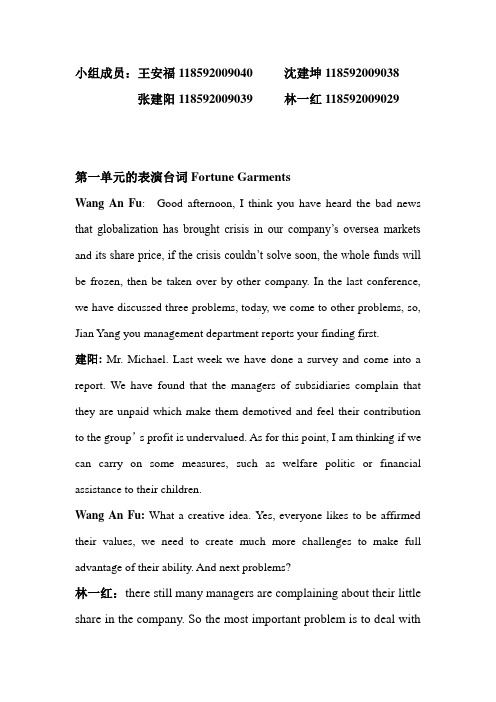
小组成员:王安福118592009040 沈建坤118592009038 张建阳118592009039 林一红118592009029第一单元的表演台词Fortune GarmentsWang An Fu: Good afternoon, I think you have heard the bad news that globalization has brought crisis in our company’s oversea markets and i ts share price, if the crisis couldn’t solve soon, the whole funds will be frozen, then be taken over by other company. In the last conference, we have discussed three problems, today, we come to other problems, so, Jian Y ang you management department reports your finding first.建阳: Mr. Michael. Last week we have done a survey and come into a report. We have found that the managers of subsidiaries complain that they are unpaid which make them demotived and feel their contribution to the group’s profit is undervalued. As for this point, I am thinking if we can carry on some measures, such as welfare politic or financial assistance to their children.Wang An Fu: What a creative idea. Y es, everyone likes to be affirmed their values, we need to create much more challenges to make full advantage of their ability. And next problems?林一红:there still many managers are complaining about their little share in the company. So the most important problem is to deal withthe share between mangers and our company.建坤:E```maybe we could have a share in the profits of subsidiary, how about 5% to 10% share ?Wang an fu: As for the share-split-up, personally I can’t decide whether the head office will separate some parts to the managers, but I will put it forward on the board of directors to further discussion. And any other problem林一红:Y es, the other problem is that all the mangers reported that they did not have enough freedom of action. They want more automony and less control from head office over finance pay and sources of material. And I discussed it with Joson the other day, now let Joson to tell us the results ,Joson….建阳: About this problem ,if managers want more autonomy and less control from head office, they should behave well and keep good performance every quarter only in this way can wefeel at ease.JK :But it is unfair to some subsidiary that are located in poor areas.we all kown ,the economise between developing countries and developed countriesare different.the standards or consumption between them could not compare .that is unfair.Wang An Fu: As for this, the head office will take some useful steps to expand their potential markets, for example, we will give them enough funds and technology supports and train their employees as long as theyhave a better performance compared with the last month. And any other ? 林一红:And then the last problem in our mange department is about the QC department ,the quality control.In this aspect ,it is still the big problem for us.W e do not do well in it until now ,so as far as I am concerned.Our managersh the staff and communicate with them more oft should contact wien,then to find the problems and solve the problems together to process together.建阳: I totally agree with you. Quality is a company’s image. Quality control can influence our company’s development in the future. So we have to enhance the quality control in the production process. We can also communicate more with other company’s managers to share good resources with each other, learn from each other and improve each other. Wang An Fu: we need to keep a close watch over every aspect of the materials, production process and the after-sale-services, so, after meeting. Joson you deliver the careful quality control to all the staffs, Okay?建阳:All right, sir. I’ll take charge of that later and give you a reply. Wang An Fu: then, lets come to the workers, JK so what is your findings? JK: Y es, ladies and gentleman, I, as the representative of staffs, have to state some of problems that our workers face . The first, because of the poor safety regulations and the common industrial accidents. staffs turnover is high. If our company will do that , I express my appreciation on behalf of our staffs.Wang An Fu: Y eah you are a considerate manager, always stands for the workers’ interests, here I want to emphasis the life security, we MUST make every effort, take every measure to protect the workers’ life, life is the most important in our company! And then the staff-turnover is a potential peril, we lost some valuable assets for our future development, so, we need to improve the safety regulation to keep the turnover from happening.JK: Another problem is the low wage, many staffs think they receive do not value their contribution to their company. so let staff sharing the profits of company, even very little ,about 0.1%to 0.5%.that is a good way to improve the motivation of our staffs.建阳: Are you crazy? If everyone wants to become a shareholder that will cost a lot, I’d rather giving them some award in the end of the year which might be more practical.Wang An Fu: yes I agree with your idea, but as for the stock-split-up, I need a further discussion. Especially the overtime work, we must give them extra pay, even double pay! And next problem?JK: The third problem we face are the condition of office. at moment the overcrowed and badly ventilated make lots of complain among staffs. 建阳:How about doing regular inspection to plant machine. It’s the most essential way to ensure the safety of workers.林一红:I have an idea about the problem ,it is to provide a lifeinsurance for every worker in our company. At the same time ,we should improve our basic facility. In some degrees, I think you are really crazy. I approve of Joson’s opinion. But do not ignore the welfare. It is quite a good way to solve the problem by prociding more good welfare.建阳: Maybe we can fix air-condition and supply heating in the most of the place. Besides, we can provide cool water in summer and hot water in winter.JK: I really agree with your idea. that is wonderful.Wang An Fu: A better environment, a better performance, so every department should make sure that their employees are satisfied with the environment.JK:Finally we have to sove the communication problem between staffs and supervisors. we all know sometimes the supervisors are not the local people or just could not say local languish .that leads to some staffs could not have something talked with them.Wang An Fu: Lifelong Learning, I think, is the most useful way to solve the communication problems, they need to adapt themselves to the challenging world--- survival of the fittest!After ten minutes’ discussion 。
Case_Study商务英语案例分析
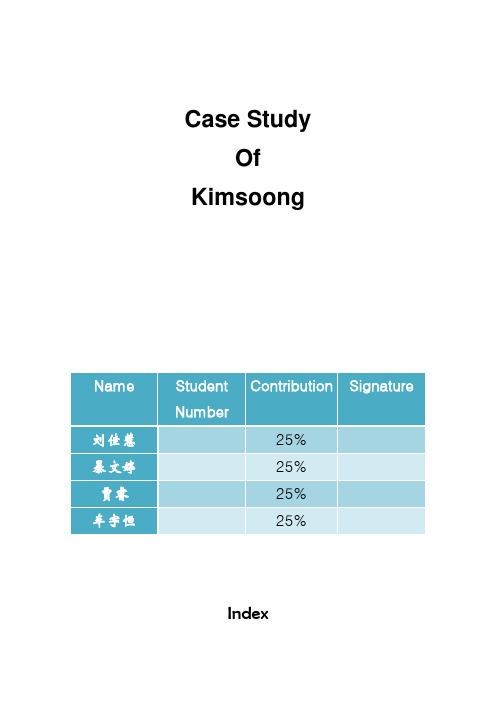
Case StudyOf KimsoongIndex1.Background information of Kimsoong (2)2. Kimsoong customer profile (4)3.Problem (6)(1).Cutomer profiles (7)(2). The excellent office workers (7)(3).Improving skills (7)(4).Cooperation (7)4.Solutions (7)(1).Building up relationships (8)(2).Increasing customer loyalty (8)(3).Drawing up an accurate buyer profile (8)(4).Encouraging staffs (8)5.Conclusion (10)1.Background information of KimsoongKimsoong, a Korean car manufacturer, has its European headquarters near Paris. It has retail sales franchises in most European countries which not only sell cars and motor accessories but also have servicing facilities. The larger outlets also offer fast-fitting of tyres and exhausts, and deal in used cars.Over the last ten years Kimsoong, with its reputation for reliability at low prices, has build up market share at the lower end of the market. Their basic models include many”extras”which other manufacturers charge for. Kimsoong also makes large donations to environmental groups and is seen as an organization with a social conscience. Furthermore, its R&D Department is developing an “eco-car” which uses an alternative power source.Then set our focus on the whole car manufacturing market.For 2009, global vehicle sales remain in the midst of a precipitous fall-off, led by sharp declines in the mature markets of the United States, Western Europe and Japan. We project total cars produced at 51,971,328.In 2006 there were 49,886,549 passenger cars produced in the world, with an increase of 6.45% over the previous year. The increase for 2007 was more modest, and 2008 showed a decline. Analysts from various institutes had in fact pegged the year 2007 as the year which would end the 5-year cycle (2002, 2003, 2004, 2005, 2006) of recordA third of all cars in the world is produced in the European Union (see chart below).Ch ina became the world’s third-largest car market in 2006, as car sales in China soared by nearly 40% to 4.1 million units. China should become the world’s second-largest car market by 2010, as low vehicle penetration, rising incomes, greater credit availability and falling carprices lift sales past those of Japan. Furthermore, vehicle penetration in China stands at only 24 vehicles per 1,000 people, compared with 749 vehicles per 1,000 people in the mature markets of the G7.It is estimated that over 600,000,000passenger cars travel the streets and roads of the world today.In the United States alone, 247,421,120 "highway" registered vehicles were counted in 2005, of which 136,568,083 passenger cars. (Bureau of Transportation Statistics U.S. Department of Transportation)So with the high development of car manufacture, we may face many difficulties. There are so many cars produced in the world, the only thing we can do to keep our position is to become more competitive in this market, or we’ll drive out b y its high competition.2. Kimsoong customer profileCustomers are the god of our company, thus the survey of customers’ tastes and basic information is important for us to know better of our shortage, and we’ll also serve more people in the fu ture and gain more profits. The following forms are information we have got from our customers.We can see that the majority of the customers are men who are under 30, they are employed. However, women between 31 and 50 who are self-employed have potential to buy our cars.Our repeated customers only occupy 15% of the whole. People who buy our cars are mostly middle income group. This is a hint that if we want to hold on to existing customers, we must produce cars that are affordable by middle income group. But to attract new customers we should provide different kinds of cars for different income level.As the form shows, customers are not satisfied with our service. The competitor’s cars are better in performance and service. These are two main reasons that hinder us to maintain existing customers. The after-sale care is just fair. In a word, customers care more about their price, reliability, after-sales service, etc. We should improve our service and convince customers of the reliability of our cars at the same time.By collecting and analyzing customer profiles, we may conclude that we can make improvement by producing cars suit every age stage, providing reasonable price for middle income group, improving our after-sales service to hold on to existing customers. We should also create cars for women and for self-employed persons and even students. High level cars with high price will attract people of high income group. These may help gain more profits.3.ProblemFacing the intense competition, the company must remain unchanged with its reputation for reliability at low prices and has its excellent office workers and loyal customers, also the skill and cooperation are very important parts. The management should solve these problems.(1).Cutomer profilesThe company’s new strategy is to hold on to existing customers and increase customer loyalty. And the company also hope to develop a more accurate buyer profile. Customers are very important to a company. So the company should know about the customers well so that we can produce the products that fit the customers. Only in this way can our company make profits.(2). The excellent office workersThe excellent office workers in the company is also a big problem. For one hand, the younger office workers have much knowledge but a little experience; on the other hand ,the elder office workers don’t have as much knowledge as the young but they have enough experience. They are all excellent, but the company doesn’t have enough money to hire both the young and the elder ones. So the problem is that the company should choose what kind of the officers they need by using less money to make more money.(3).Improving skillsImproving skills is also a big problem to the company. Because of the ever-accelerated science and technology, having a superb skill can save cost and make profits.(4).CooperationLast but not the least, cooperation is very important to the company. But the company’s staffs are lack of the skills of grasping good communication. So if the company want to do better, they must promote social skills and competence.4.SolutionsAiming at the problems given above, we summarize some solutions to those problems:(1).Building up relationshipsTo builds up long-term customer relationships, thereby increasing profits.To establish long-term cooperation relations, the customer is one of the important fa ctors that assure our company’s long-term and stable development. In the long-term cooperation relations, the company can not only improve enterprise image, enterprise credibility still can bring stability of the interests of the enterprise income. Only in this way, can the enterprise form a security capital chain. Additionally, through this long-term cooperation, we can build trust with each other and win good enterprise image, thus our company will expand more customer groups and win more profits.(2).Increasing customer loyaltyIncreasing customer loyalty is to guarantee the premise of enterprise sales. First, our company shall keep good communication with customers. The price for the customers must be given favorable; we can also use the gifts method to increase satisfaction. Cheap and good things will receive the love of consumers, so we should be radically improve the competitiveness of our enterprise, by improving products’ performance in all aspects so as to reduce the cost. Once the cost reduced, we will not only attract more customers to buy our cars, but also enhance our profit space, that is kill two birds with one stone.(3).Drawing up an accurate buyer profileEnterprise’s accurate understanding of his client group is very important. The company should not only know the customer's age distribution, but have an understanding of what kind of car sales good. At the same time, we must pay attention to customers’ feedback, make market surveys, know what kind of car our customers really want to buy. F rom these information we will realize our company’s deficiencies, so as to further improve their product, as well as the enterprise’s all aspects of operation.(4).Encouraging staffsTo encourage staffs to be more active in building up good customer relations.It is not enough to just have a good car, a good people who can promote it is necessary. So encourage staffs to establish good relationship with customers is very important. Nowadays, the consumer not only pays attention to the quality of the product itself,but is very concern about enterprise service attitude. First, the company shall encourage the staffs to work hard to establish a good relationship with their clients. For those who have outstanding performance , the company sales should give them full praise and encouragement. For those who not work hard, and have poor work performance, our company shall take appropriate punishment. Everyone must have crisis consciousness. Second, team spirit is very important. The common saying says more people, more powerful. Only we work together can we create more profits for our company.5.ConclusionFrom the report above, we can see that good customer relationships are very important for our further development. Only when we win our customers’ loyalty, can we gain more profits and make a good reputation. Thus, improvement of all aspects, including staff training, survey of customers and potential ones, change of disciplines and politics in our company and so on is of importance. We should also appreciate other competitors strengths and learn to use them for ourselves. I believe that our company will develop well in the future and attract more customers to buy our cars.。
商务英语写作8求职信
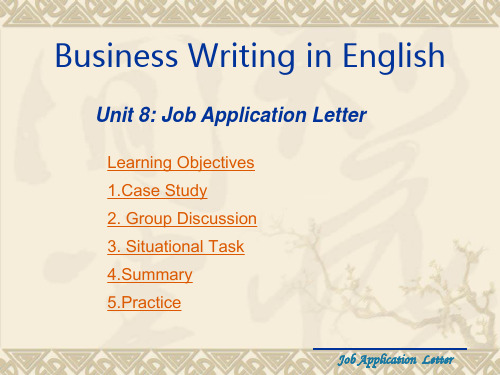
Job Application Letter
2 Group Discussion
1. What’s the purpose of writing a job application letter? ❖ The purpose of drafting a letter of application is to introduce
Job Application Letter
3 Situational Task
❖ If you need any further information, please let me know. I will appreciate it very much if you if you grant me an interview. And I can be reached anytime via email at li_xin@ or my cell phone, at 13777220011.
Job Application Letter
1 Case Study
The opportunity presented in this listing is very interesting, and I believe that my strong technical experience and education will make me a very competitive candidate for this position. The key strengths that I possess for success in this position include: I have successfully designed, developed, and supported live use applications. I strive for continued excellence. I provide exceptional contributions to customer service for all customers.
Unit-2-Selling-online-体验商务英语综合教程2-

Online shopping websites
Starting up
C
Why do some people prefer not to buy goods and services online?
You may find that goods are not suitable when they arrive or get things you did not order.
Keep a paper trail. Print and save records of your online transactions, including the product description and price, the online receipt, and copies of every email you send or receive from the seller. Read your credit card statements as you receive them and be on the lookout for unauthorized charges.
Unit 2 Selling online
Quotation
This quotation means a bad business idea will not work any better just because it is being used as the basis for selling via the Internet. The technology will not, in itself, make up for any deficiencies.
The Internet is an exciting tool that puts vast information at your fingertips. With a click of a mouse, it lets you buy an airline ticket, book a hotel, send flowers to a friend, or purchase your favorite stock. Good deals, convenience and choices abound on the Internet. But before you use all the Internet has to offer, be "cyber" smart and make your online experience safe.
商务英语谈判4

Sample Negotiation: L: Hello, Mr.Smith. Glad to see you Hello, again. S: Nice to see you again. L: I believe you must have studied our sales literature. How do you like our products? S: I think your products just meet my requirements. I’m thinking of placing an order with you for model 1350. Could you give me some idea about your price?
II. Case study.
I have a problem with a supplier who is the sole supplier of our organization. The supplier manufactures various items for us which are used in our products. Now the supplier is insisting on a price increase of about 50% without any justification. We are a governmentgovernmentowned organization involved in manufacturing several products for our clients--which are clients--which other industrial concern.
How should we approach this situation given our organization’s limited annual budget?
体验商务英语casestudyprofitorprinciple

3.What action should you take concerning the possible leak of information?
Board:董事会
1.We think the bad relations between Valerie Harper and Carl Thomson is not Valerie's problem. There are two secretaries resigned because of Carl's bad temper.
2-3:At first, we would clear up whether he has leak of information to our rival. We would talk with him .If that is not true, we would remind his behaviours and let he signed “Confidentiality agreement” which covers treatment measures if violation of agreement . And we would consider to pay for conditional allowance to him.
outstanding employee.
However,more recently she has been having
difficulties working with Carl.
They have been shouting at each other,and often
商务个案研究businesscasestudy
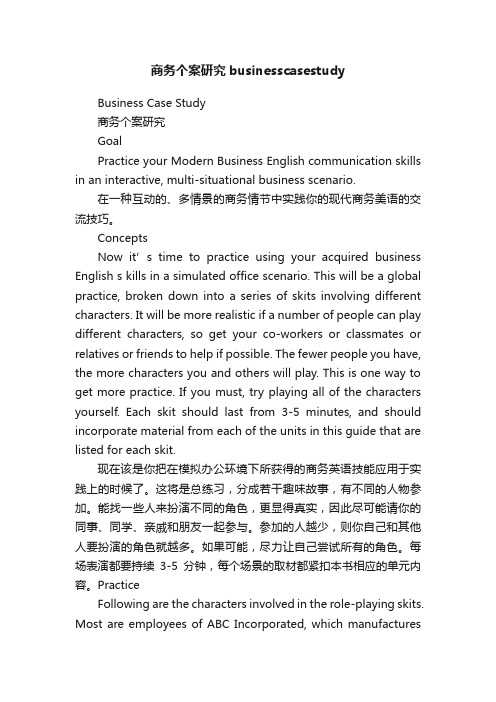
商务个案研究businesscasestudyBusiness Case Study商务个案研究GoalPractice your Modern Business English communication skills in an interactive, multi-situational business scenario.在一种互动的、多情景的商务情节中实践你的现代商务美语的交流技巧。
ConceptsNow it’s time to practice using your acquired business English s kills in a simulated office scenario. This will be a global practice, broken down into a series of skits involving different characters. It will be more realistic if a number of people can play different characters, so get your co-workers or classmates or relatives or friends to help if possible. The fewer people you have, the more characters you and others will play. This is one way to get more practice. If you must, try playing all of the characters yourself. Each skit should last from 3-5 minutes, and should incorporate material from each of the units in this guide that are listed for each skit.现在该是你把在模拟办公环境下所获得的商务英语技能应用于实践上的时候了。
case study 体验商务英语

Choose the three best ideas and add them to the agenda.
AGENDA (DRAFT) Suggestions for improving communications
i) Introduce an “employee of the month” scheme
ii) ____________________________________ iii) ____________________________________ iv) ____________________________________
Suggestion Regular e-mail newsletter
Advantages Convenient More information ……
Effective communication skills
1.沟通七要素(seven catagories in communication)--《管理 沟通原理与实践》 • • • • • • •
沟通发起人/沟通者(source/communicator) 听众(audience) 沟通目标(goal) 背景(context) 信息(message) 沟通媒介/沟通渠道(media/channel) 反馈(feedback)
Some general knowledge: • 1.Forms of communication • 2.Effective communication skills • 3.The cadinal princepal to creat the organization of communication
Case Study
- 1、下载文档前请自行甄别文档内容的完整性,平台不提供额外的编辑、内容补充、找答案等附加服务。
- 2、"仅部分预览"的文档,不可在线预览部分如存在完整性等问题,可反馈申请退款(可完整预览的文档不适用该条件!)。
- 3、如文档侵犯您的权益,请联系客服反馈,我们会尽快为您处理(人工客服工作时间:9:00-18:30)。
Anna Belinski
Background higher, experienced, have some achievements, languages highest, have herself mind, developing website, good at computing, Quiet, not very practical, few ideas about the company’s
weakness
Linguistic ability Older, lower lower, education energetic, background lower,
we choice Robert Kaminsky .
There are reasons: 1、He more experienced than other. 2、His sales is increasing. 3、He is calm and relaxed. 4、He is practical and reliable than other.
Polish, aged 52 Education University degree (Engineering) Experience in a variety of industries. Joined Fast-Track five years ago as Regional Manager for the south of Poland. Achievements Has been fairs successful, increasing sales by 12% over the five-year period. Languages Fluent Polish and English. Interviewer’s comments Very calm and relaxed, he moves and talks slowly. A hard worker. He never leaves the office before seven in the evening. Not creative but happy to get ideas from the creative members of a team. Respected by previous staff. Current staff think he is practical and reliable.
云南师范大学华文、国语学院 2011级金融D班 黄佑娥
Unit 1 Fast-Track Inc.
Fast-Track Inc., based in Boston, US,
Background
sells corporate training videos and management training course. It is looking for a new Sales Manager for its subsidiary in Warsaw, Poland. Fast-Track advertised the vacancy only inside the company as it believes in offering career opportunities to its staff.
Secondly:
He/She will be: 1、a natural leader 2、energetic, enthusiastic and determined 3、 confident and outgoing
Thirdly:
He/She will be: 1、strong sales ability 2、organisational and interpersonal skills 3、a good academic background and suitable experience 4、numeracy skills and the ability to handle administration 5、linguistic ability
Discuss
Joanna Pelc
strengths
Younger, experienced, good at computing, natural leader, strong sales ability, energetic and confidegher, experienced, increasing sales, languages fluent, calm and relaxed, work harder, team spirits, practical , reliable.
The subsidiary’s resent sales results were poor. Sales revenue was 30% below target. The reasons are:
1~Sales representatives are not motivated and staff turnover is high. 2~The previous manager had no clear strategy for developing sales in the area. 3~Only a few sales contracts were made with client companies senior managers.
Joanna Pelc
Polish, aged 30 Education: Finished secondary school. Diploma in Marketing Experience: Has worked for Fast-Track as a sales representative since leaving school. Has a good knowledge of computing. Achievements : Has had the best sales results of the team during the last five years. She looks after some of the company’s most important customers. Languages: Excellent Polish and Russian. English-good vocabulary but not very fluent. Interviewer’s comments :Very strong personality. Energetic and confident. Sometimes appeared aggressive during the interview. Will she be a good team player?
We do think he is quiet qualified for the work, and he could competent.
•
Unit 2 Lifetime Holidays
Lifetime Holidays is a package holiday firm. It has many high street shops and a large catalogue of holidays. However, it is currently facing problems. Fewer people are visiting its shops, and demand for its customers are aged over 50, so it now wants to appeal to a wider range, especially those aged 30 to 50. The solution seems to be to sell holidays online. As Lifetime has no experience of ecommerce, they want to join with an existing online company, DirectSun. DirectSun is a low-budget holiday website. It offers cheap flights to a small range of destinations and can arrange accommodation, insurance and car hire. It has a good customer base, but it wants a bigger catalogue of holidays to offer. The two firms have met several times and are now ready to negotiate the details of a possible joint venture.
There are three candidates for the position of Sales Manager, Central and Eastern Europe. They all already work for Fast-Track either in Boston or in Warsaw. Here is an extract form the job description for the position. The position will involve frequent travel throughout the region.
Robert Kaminsky
Anna Belinski German, Aged 42 Education University degree (History) Achievements Over 15 years as a sales representative in Germany, the US and Poland. Joined Fast-Track a year ago. Has some experience designing websites for companies. Achievements A good sales record in all her previous jobs. In her first year with Fast-Track her sales results have been satisfactory. Languages Fluent German, English and Polish. Interviewer’s comments Quiet but knows her own mind. Rather nervous at the interview. Might be good at team building but would probably depend too much on other people. Had some interesting ideas for developing our website. Good at computing and hading figures. Likes administration. Didn’t seem to have many ideas about the future of the company.
